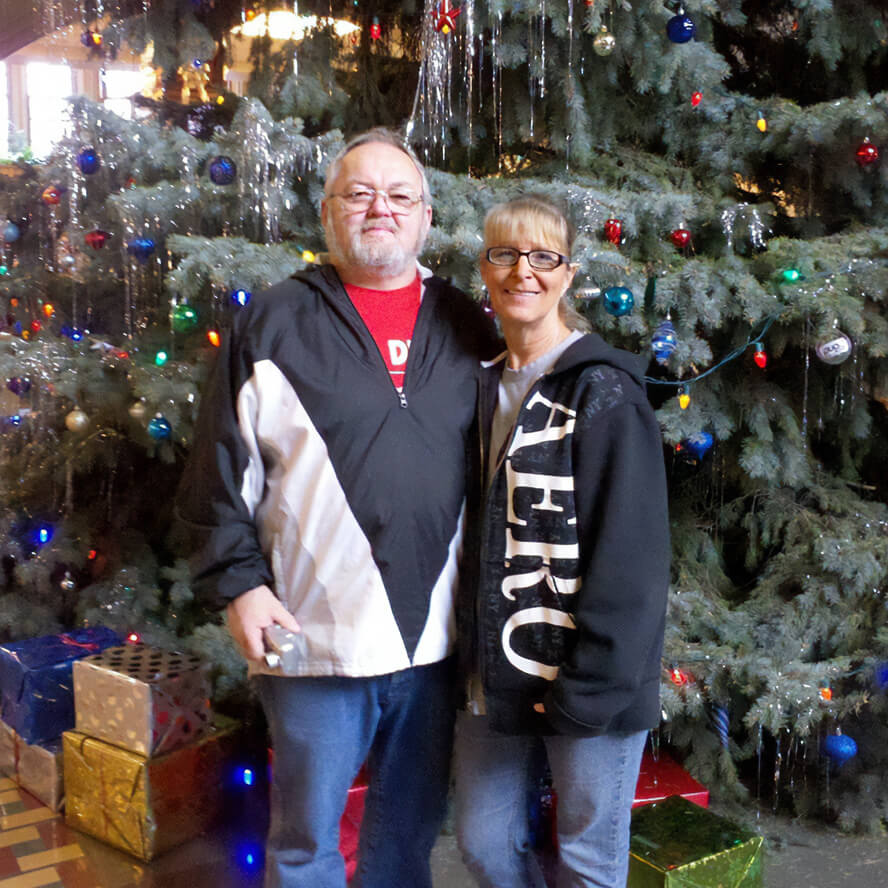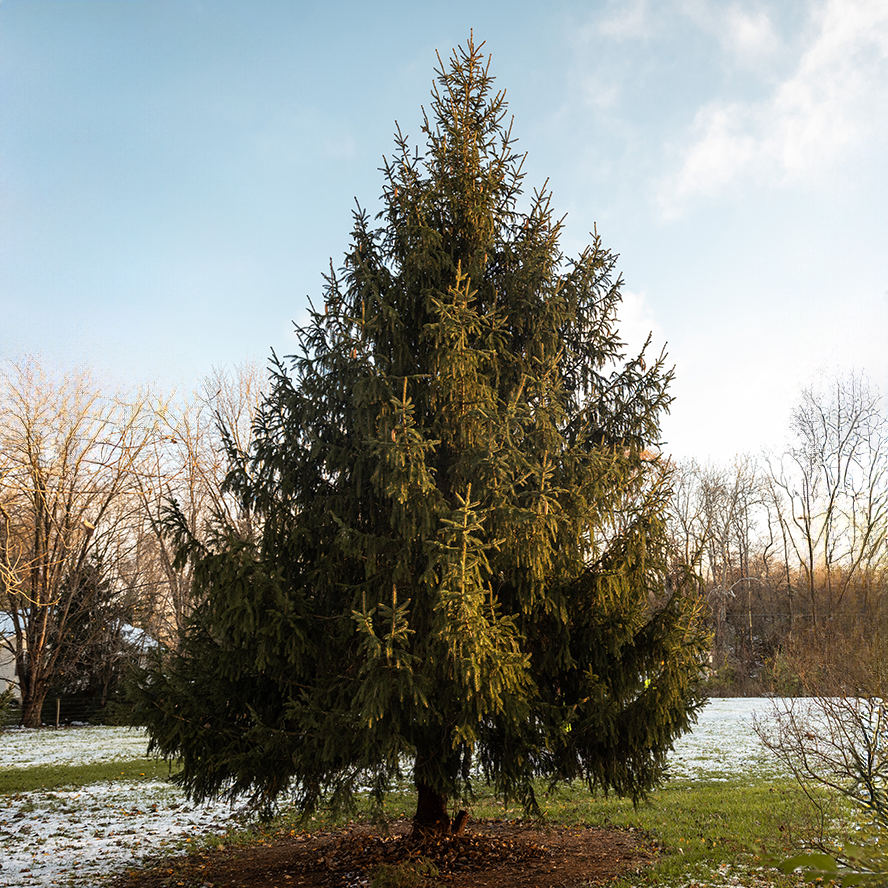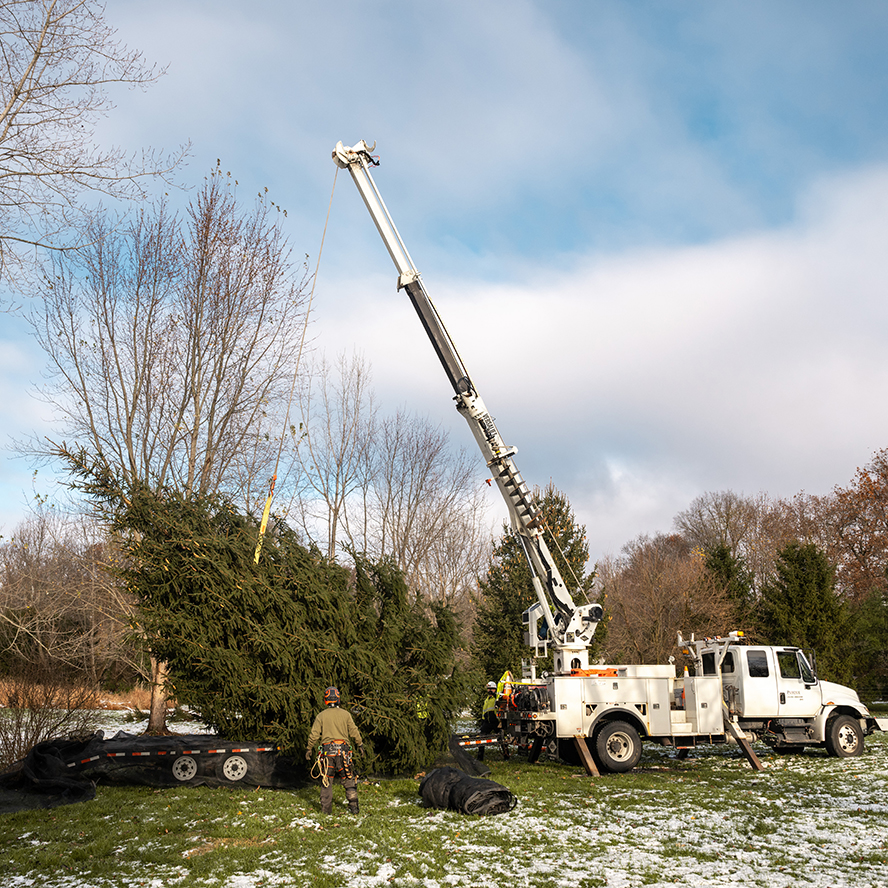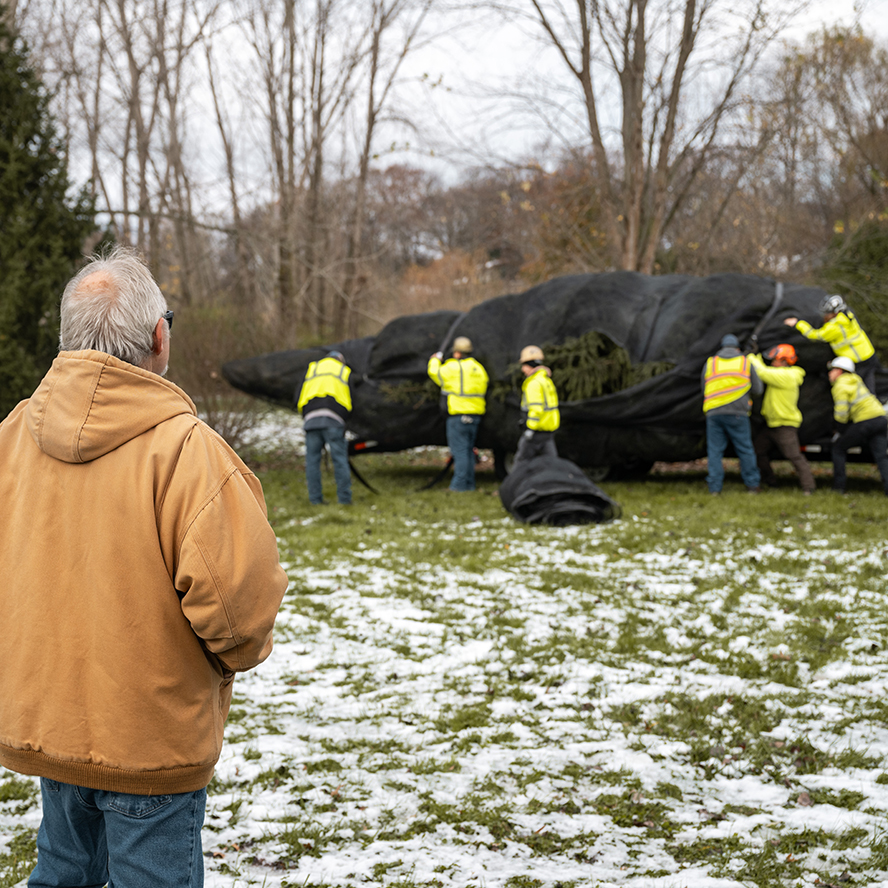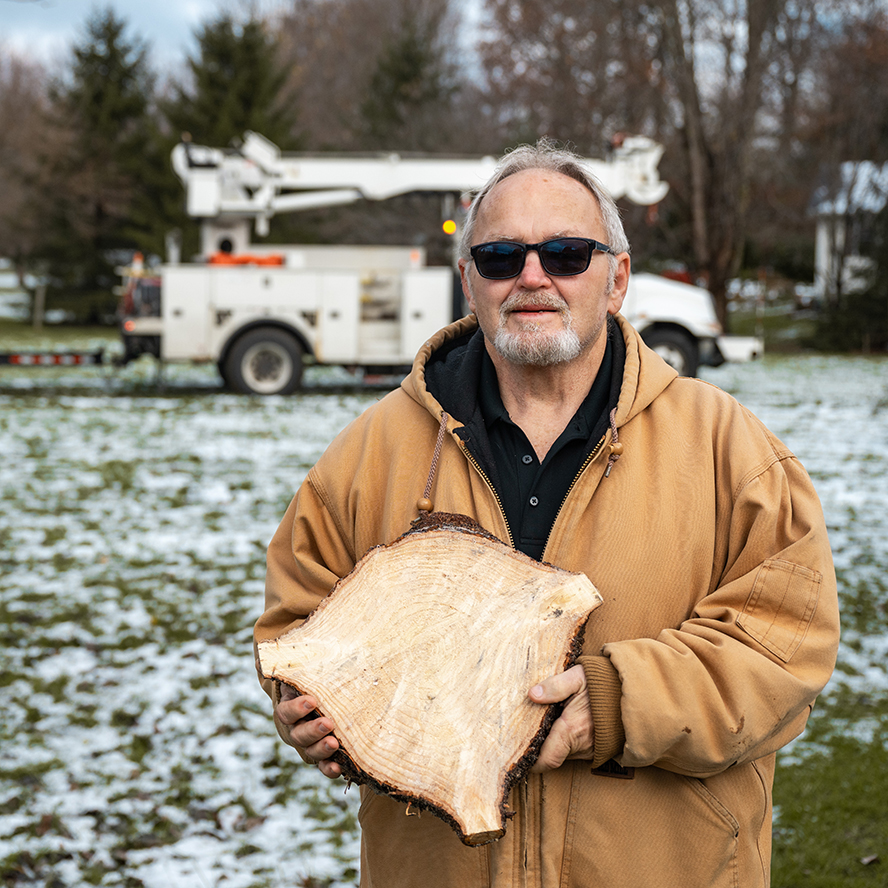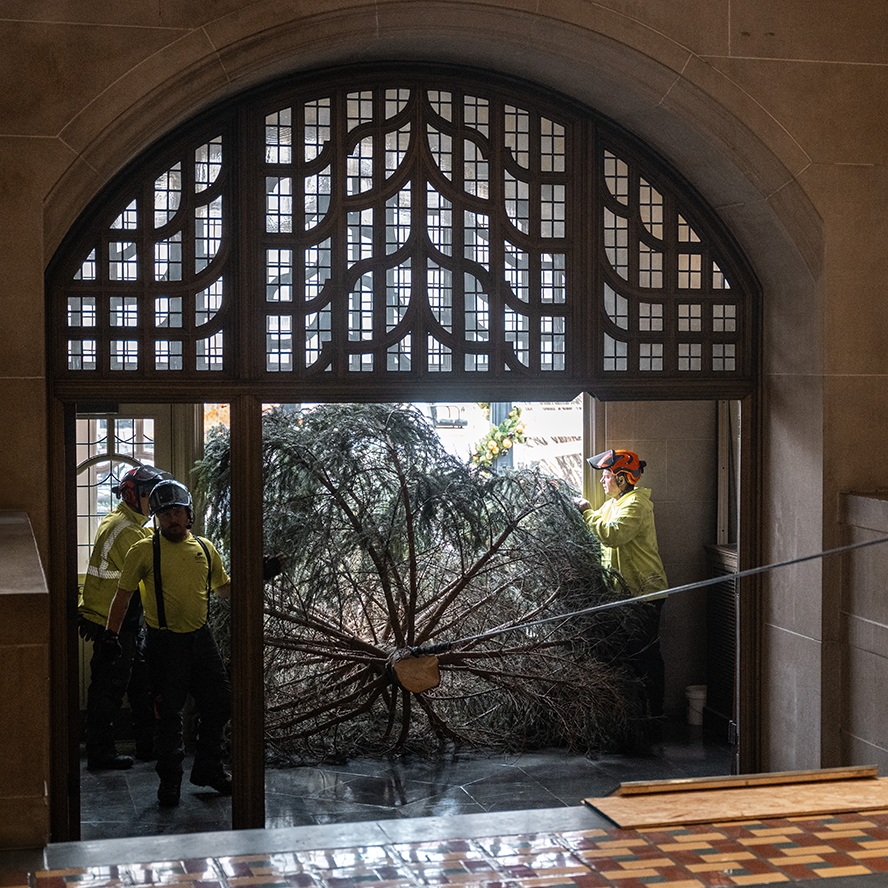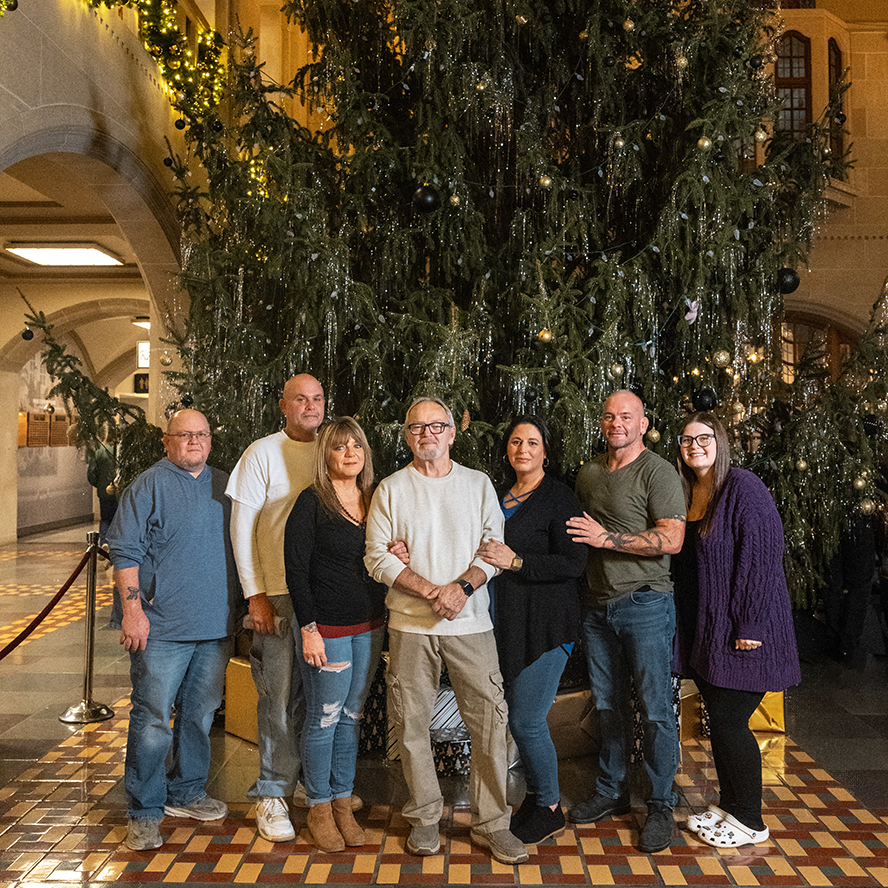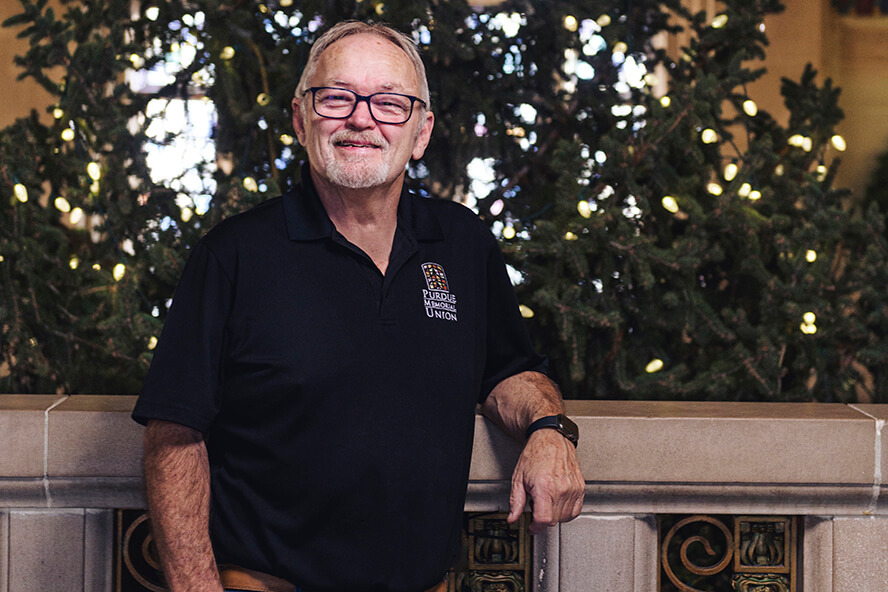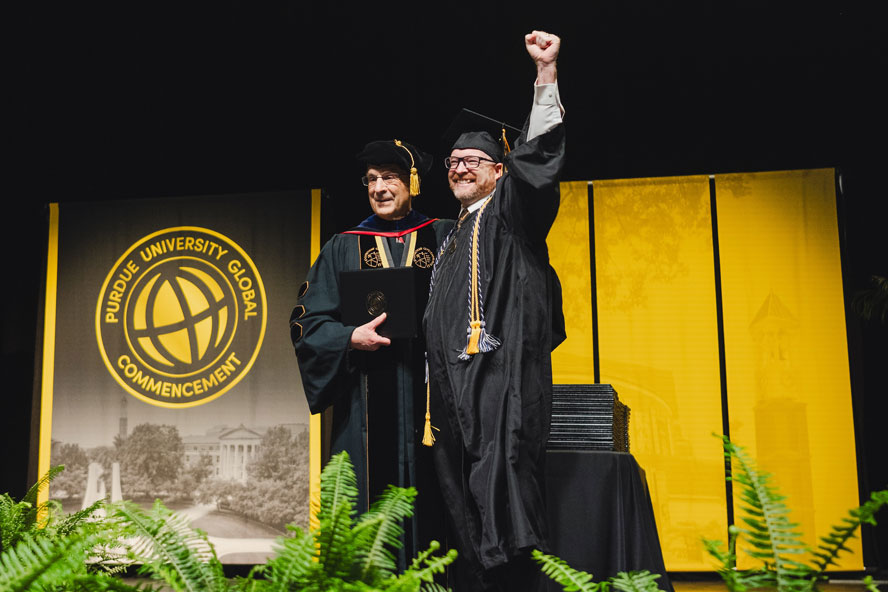This is where: Purdue and Rolls-Royce safeguard our future
This story highlights one of the many ways Purdue teams up with corporate partners to create solutions for complex global challenges. Learn how your organization can collaborate with us.
Leaders in academia and industry are advancing aerospace research together
Who knows how to stay one step ahead?
From state-of-the-art facilities in West Lafayette, Purdue and Rolls-Royce are leading the world in what’s next for aerospace research.
“Purdue is a world-class research institution and a top university in the U.S. for engineering aeronautics and astronautics,” says Warren White, head of assembly and testing at Rolls-Royce. “Our partnership is strengthened by an aligned interest in transformative technologies in civil and defense aerospace.”
For over 70 years, this partnership has safeguarded national security and provided innovative solutions. Today, it continues to lead progress in critical fields, including advanced manufacturing, compressor and turbine technologies, and hybrid-electric and hypersonic propulsion.
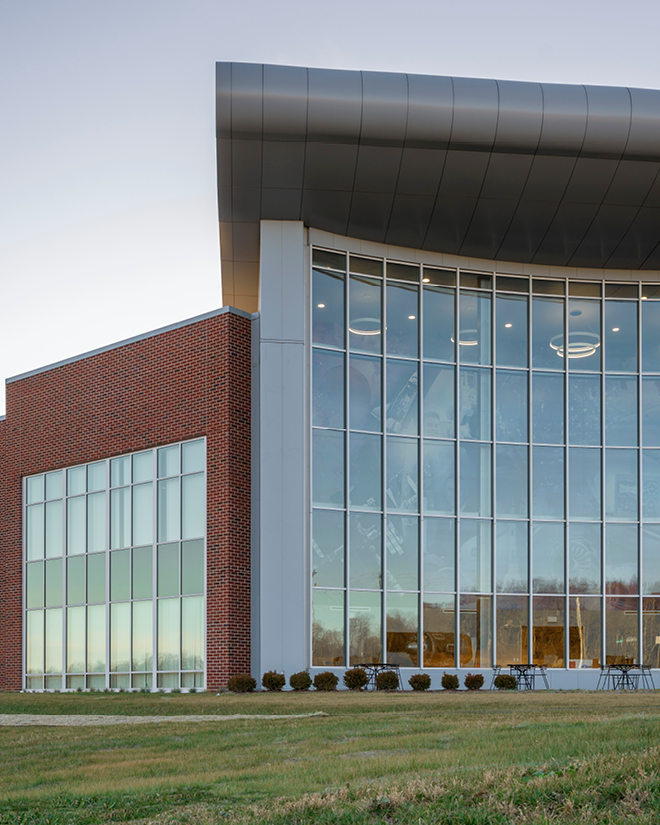
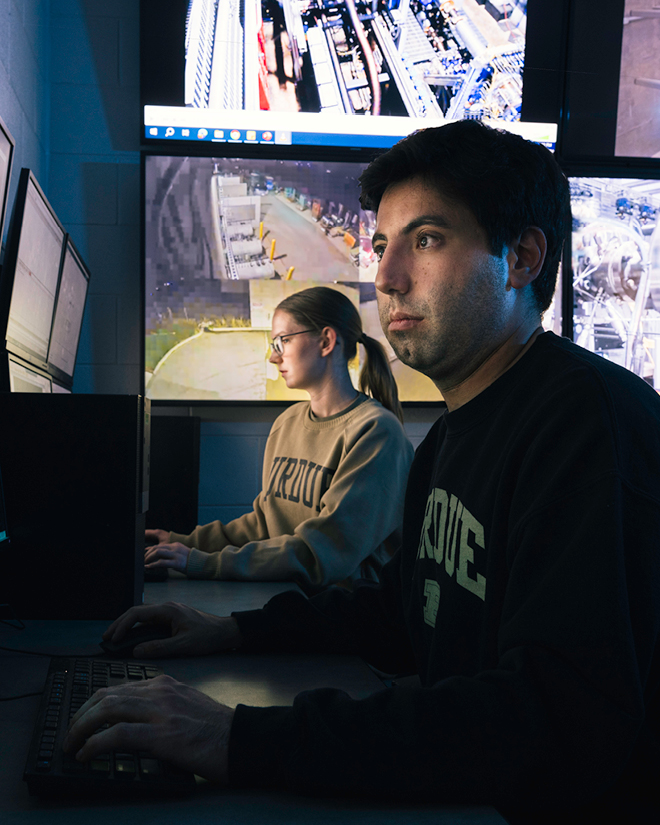
What the partnership prioritizes
While technological capabilities have advanced significantly since Purdue first used Rolls-Royce engines for a post-World War II project, one thing has remained constant: the Purdue and Rolls-Royce partnership has remained at the forefront of futuristic feats.
The two organizations are pioneering the next iterations of U.S. military aircraft. In 2003, Purdue was designated as the first Rolls-Royce University Technology Center (UTC) partner in the U.S.
“Giant leaps in aerospace happen here,” White says. “We are proud to be working with Purdue to advance these efforts.”
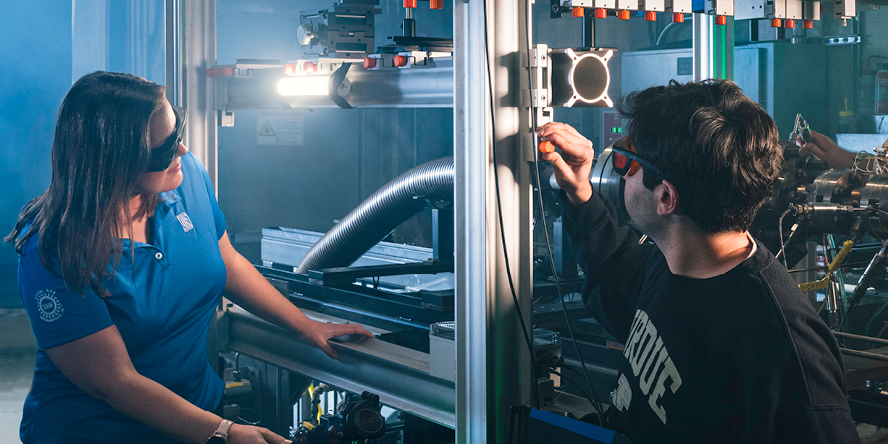
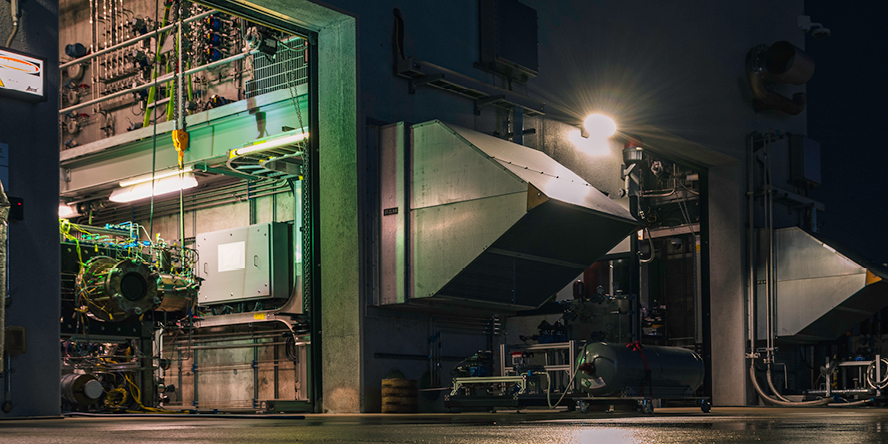
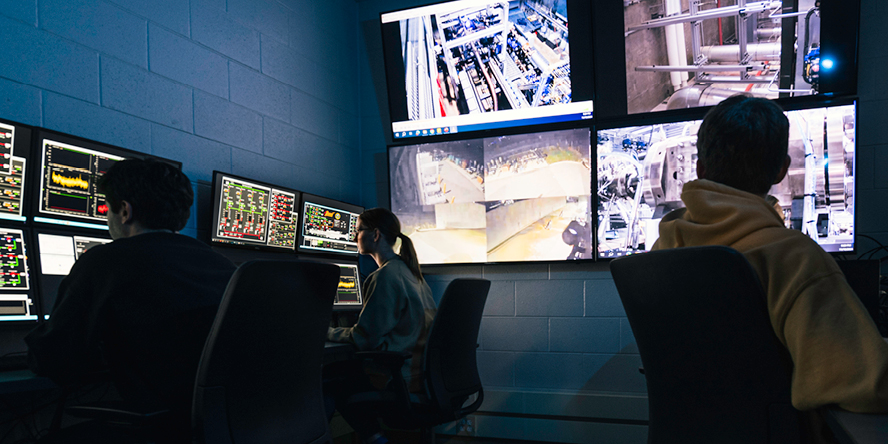
Those giant leaps include forging a more sustainable future in aviation by employing hybrid-electrical technology instead of relying on fossil fuels; overcoming challenging operating environments with improved high-altitude testing; and helping aircraft reach high speeds with hypersonic systems.
Where collaboration takes place
Boilermakers don’t have to travel anywhere to find extraordinary opportunities — because of Purdue’s status as a UTC, students have access to top-tier facilities, a network of notable leaders plus work-study, co-op and intern positions.
“I chose Purdue because our chemical propulsion and combustion research is unmatched,” says Tristan Shahin, a PhD student in the School of Aeronautics and Astronautics. “Students are given ownership over the design, fabrication and operation of experiments that utilize pressures, temperatures and flowrates. Our work has direct relevance to government and industry partners.”
“The competition for engineering resources has never been fiercer,” White says. “Our relationship with Purdue has been instrumental in developing a strong pipeline of talent. Today more than 700 Rolls-Royce engineers have a degree from Purdue.”
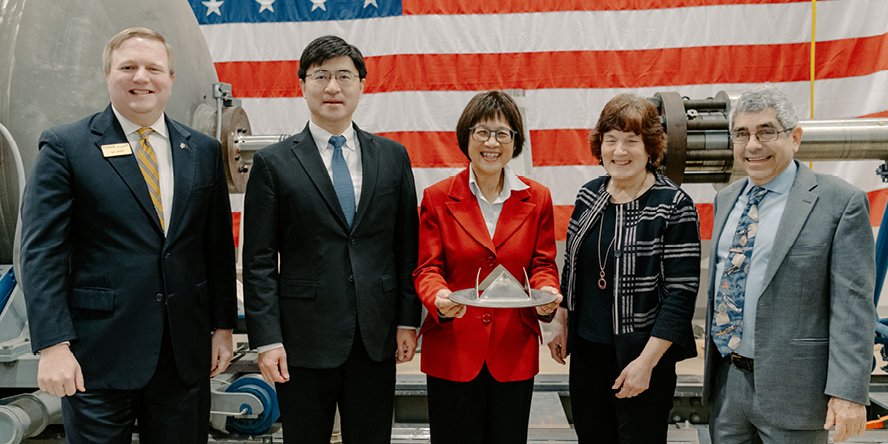

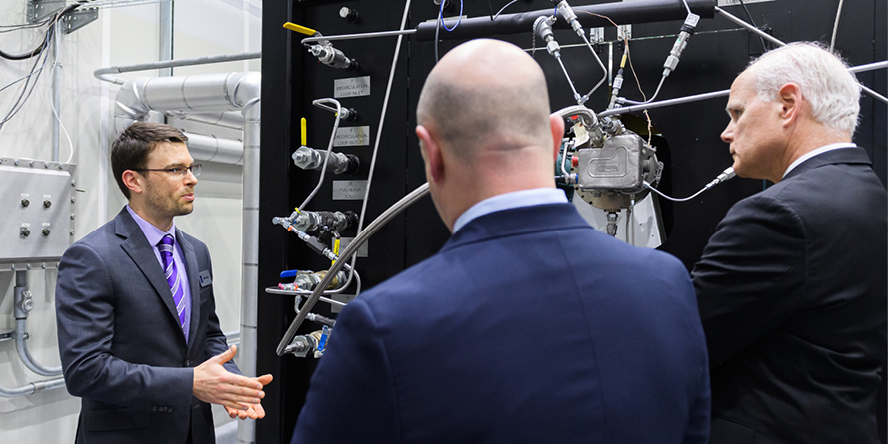
In 2022, Purdue and Rolls-Royce signed the largest industry-academia deal in the university’s history: a 10-year, $75 million strategic alliance. Since then, major investments have benefited Purdue’s Zucrow Laboratories — the largest academic propulsion laboratory in the world — as well as the Hypersonics and Applied Research Facility (HARF), home to the only Mach 8 quiet wind tunnel in the world and the hypersonic pulse (HYPULSE) reflected shock/expansion tunnel.
“I work right alongside other Boilermakers,” says Tonya Munevar, a testing outsource manager at Rolls-Royce who earned a master’s degree in technology and research from Purdue in 2011. “A personal highlight for me is supporting the students as they transition from theoretical thinking to industry practice while helping them understand and adapt to the new expectations.”
When security matters most
Ever-evolving capabilities place even more pressure on not only being prepared for today but being able to anticipate the challenges of tomorrow. Global rivals’ attempts at ensuring dominance have led the U.S. Department of Defense (DOD) to seek new opportunities with academia and industry partners.
Research between Purdue and Rolls-Royce aligns with critical technology areas designated by the DOD, including the implementation of innovative and cost-effective hypersonic systems. Advancements in the field of high-speed flight will further bolster the nation’s air, land and sea operational forces.
Purdue’s Hypersonics Advanced Manufacturing Technology Center, located within HARF, hosts the only vertically integrated prototyping center in the U.S. Researchers can complete the designing, manufacturing, joining and testing of hypersonic components in one location. There, new systems can be developed quickly — long before competitors.
Giant leaps in aerospace happen here. We are proud to be working with Purdue to advance these efforts.
Warren White Head of assembly and testing at Rolls-Royce
Students and researchers regularly test components for Rolls-Royce that end up in industry-changing aircraft, like the V-22 Osprey that combines the vertical performance of a helicopter with the speed of a top aircraft. Teams in West Lafayette work on Rolls-Royce engine lines fit for tiltrotor, rotorcraft and energy applications.
Why we persist
Every year, new projects in West Lafayette propel the world forward. The Discovery Park District at Purdue is a launch pad for businesses, from Fortune 100 companies to early-stage startups. Rolls-Royce has involved those on campus, in the West Lafayette community and across the state of Indiana to strengthen a global network.
“Working with partners like Rolls-Royce highlights Purdue’s involvement in shaping the future of aerospace propulsion,” Shahin says. “It’s easy to see the broader impact of our work when we’re turning wrenches on hardware that actively flies in aircraft.”
“Over the next decade, we’ll continue to explore transformative technologies in civil and defense aerospace, advanced manufacturing, and materials science,” White says. “Together we will help define the future ways to power, protect and connect people everywhere.”
This is where: Purdue and Wabash are driving the future of clean energy
This story highlights one of the many ways Purdue teams up with corporate partners to create solutions for complex global challenges. Learn how your organization can collaborate with us.
Innovative collaboration sparks game changer for sustainability — an energy recapturing trailer
Taking the next giant leap in eco-innovation
The transportation sector is one of the leading contributors to greenhouse gas emissions in the U.S. according to the EPA. Brent Yeagy (BS environmental engineering science ’94, MS safety engineering ’98), president and CEO of Wabash, wants to change that. So, he’s partnering with Purdue.
Wabash — one of the largest trailer manufacturers in the nation — will spend the next three years collaborating with Purdue on an R&D project resulting in a device that enables trailers to recapture their own electricity from vibrations, heat and airflow.
Such an energy-harvesting machine could transform the industry. And Yeagy credits Purdue with accelerating and driving this innovation.
“Purdue brings world-class expertise in engineering and research that complements Wabash’s deep industry knowledge,” he says. “Through this partnership, we can explore groundbreaking ideas and push the boundaries of what’s possible. Purdue’s state-of-the-art facilities and talent pool accelerate our ability to innovate, making what might seem impossible, achievable.”
As the transportation industry moves toward decarbonization and electrification, projects like the energy recapturing trailer are critical to achieving clean energy goals.
“This collaboration allows us to approach the project with a level of technical depth and academic rigor that wouldn’t be possible on our own,” Yeagy says.
Purdue brings world-class expertise in engineering and research that complements Wabash’s deep industry knowledge. Through this partnership, we can explore groundbreaking ideas and push the boundaries of what’s possible.
Brent Yeagy, BS environmental engineering science ’94, MS safety engineering ’98
President and CEO, Wabash
Blue-sky thinking leads to practical solutions
A key deliverable in this project is data. Through retrofitting the trailer with displacement sensors, accelerometers, anemometers, pressure gauges and many other measurement tools, the research team will measure how much energy is wasted and how much of it can be recaptured.
Principal investigator James Gibert, an associate professor of mechanical engineering at Purdue, says that when the project is complete, Purdue will have fully studied and characterized the Wabash trailer.
“We will know where the sources of energy are in the trailer,” Gibert says. “And we will be able to share that knowledge with Wabash. This information will pave the way for commercially developing devices that can offset some of the load that the trailer sees.”
Gibert leads a team of three colleagues and six graduate students through this multiphase work. Senior Wabash engineers are involved too, meeting biweekly with the Purdue team and accompanying them on experimental runs.
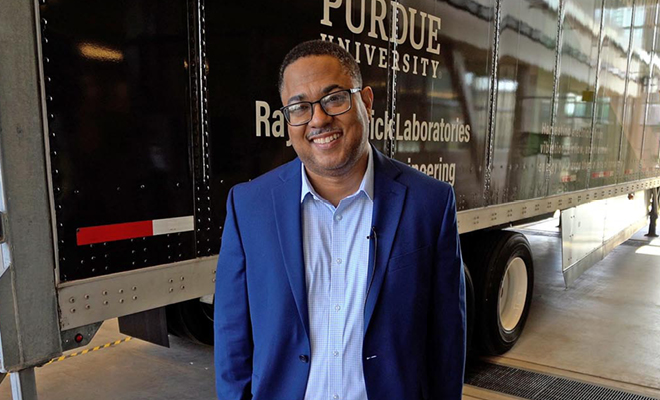
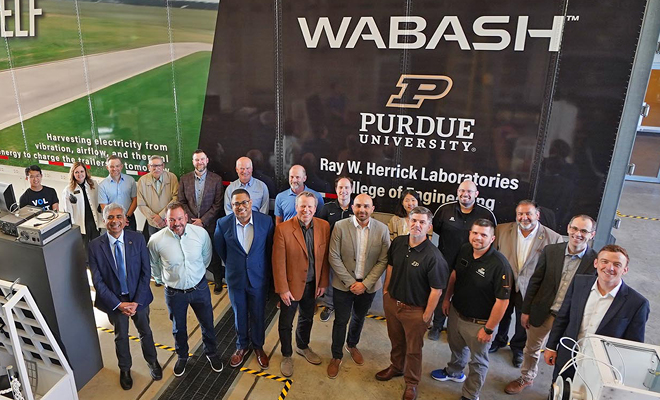
Work on the data acquisition system is being driven by Purdue students like Karthik Boddapati, a fifth-year PhD student in mechanical engineering.
“In a typical U.S. Class 8 truck,” says Boddapati, “aerodynamic power losses account for nearly 25% of the total power consumption. I focus on analyzing airflow around the truck body and developing aeroelastic energy harvesting devices to capture energy from these aerodynamic losses.”
Measuring how vibrations can be harvested is a crucial aspect of the research project, with mechanical engineering doctoral students Yeongeun Ki analyzing the truck bed and truck wall and Karsten Hilgarth exploring the side panels.
Eric Williamson, a second-year doctoral student in mechanical engineering, who also has a BS and MS in aeronautical and astronautical engineering from Purdue, primarily focuses on the suspension and the analysis of experimental data.
This confluence of creativity makes Purdue an especially attractive research partner for companies like Wabash. “We have a talent pool of ideas and a fresh set of eyes,” Gibert says.
He also points out that an advantage to working with Purdue is that the university operates with a different set of constraints than industry partners.
“Our timetable and the commitment we can put in our projects are different than those of Wabash,” he says. “They’re busy running a business, delivering products. We can provide them with a more focused brand of research because that’s what we’re tasked to do all day. We’re not worried about the other aspects of running a business.”
Long-standing partnership leads to new approaches
Wabash’s connection with Purdue dates to the company’s founding in 1985 by Purdue alumni, and those ties remain strong.
“Several of us on the executive team are proud Boilermakers,” Yeagy says. “Over the years, we’ve collaborated on initiatives ranging from manufacturing Boilermaker Specials to student research projects and employment opportunities.”
In 2021, Wabash formalized a five-year R&D agreement through Purdue’s Office of Industry Partnerships. This expanded collaboration strengthened the company’s relationship with the Daniels School of Business and the College of Engineering. Yeagy says this creates “incredible synergy between Purdue’s cutting-edge research and Wabash’s industry expertise to tackle ambitious challenges together.”

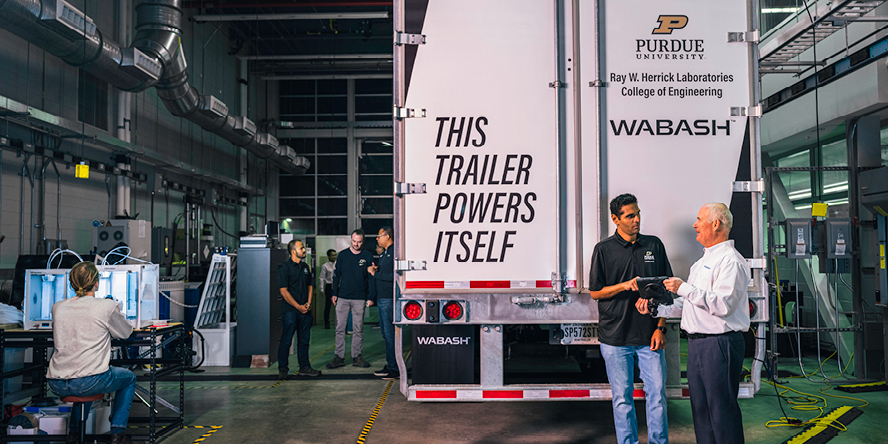
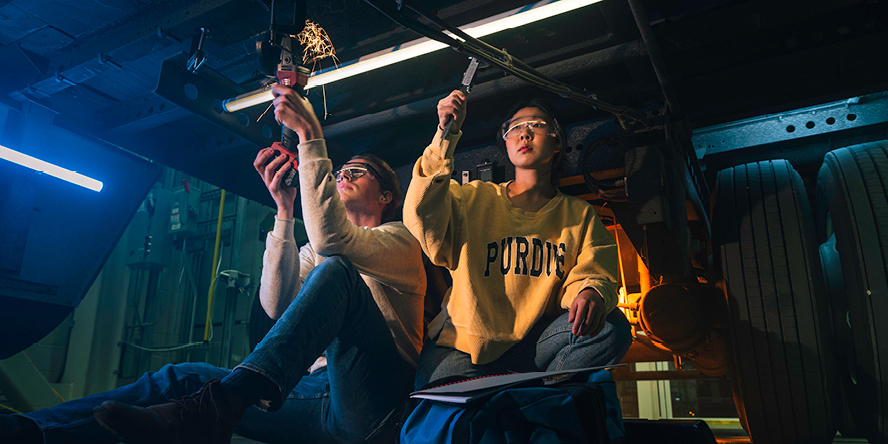
Wabash is constantly thinking about how energy is used and generated in logistics in the hopes of paving the way for more sustainable solutions. “By investing in innovation,” he says, “we’re not just meeting today’s demands — we’re shaping the future of our industry and ensuring that Wabash remains at the forefront of transformative change.”
Applications for the technology could include powering the refrigerated part of the trailer or the auxiliary systems. “It all goes back to helping the trailer be more energy efficient,” Gibert says. “And there are many different avenues to approach this from.”
For Gibert, one of the most appealing aspects of a partnership like the one between Purdue and Wabash is it enables people who are not part of the university system to see the expansiveness of Purdue’s influence and how it directly affects them.
“There is a growing sentiment that academic work is ivory tower and not useful,” he says. “But we’re able to tangibly demonstrate how the research we can do is making an impact.”
This is where: Purdue and Lilly are partnering on a shared mission to improve lives worldwide
This story highlights one of the many ways Purdue teams up with corporate partners to create solutions for complex global challenges. Learn how your organization can collaborate with us.
Celebrating the history and future of a transformative collaboration built on Indiana soil
History has shown that when Purdue University and Eli Lilly and Company join forces, lives are transformed.
Together, these Indiana institutions are driving critical breakthroughs in drug discovery and pharmaceutical research, tackling some of the most complex challenges in modern health care and preparing the next generation of industry innovators.
Today’s efforts are built on a partnership that spans more than a century, united by a shared mission to build a better world.
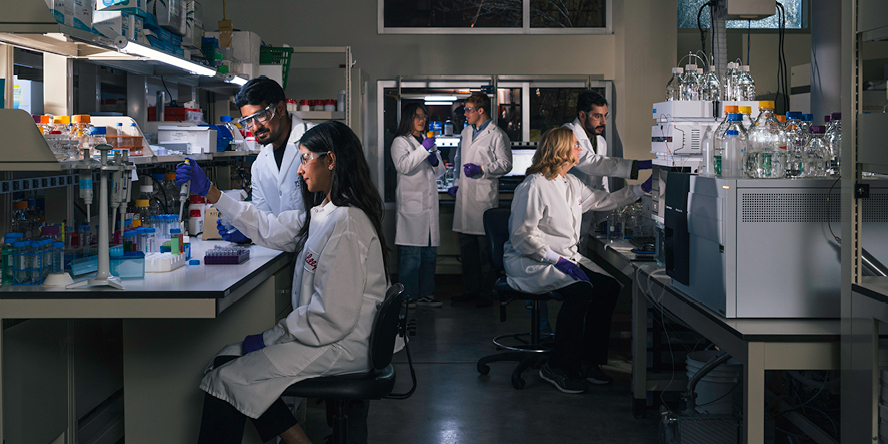
A legacy of collaboration
In 1854 Eli Lilly, future founder of the company that shares his name, began an apprenticeship at the Good Samaritan Drug Store on Main Street in downtown Lafayette. Just 20 years later, Purdue welcomed its first class of students a few miles across the river. Two years after that, Lilly founded his company in a small building on Pearl Street in Indianapolis.
Both organizations sprang up during a transformative era in U.S. history, growing alongside a nation brimming with ambition and innovation, each striving to shape lives in ways that still resonate today. Early on, both organizations recognized that the other would be a critical partner in their shared pursuit of a better, healthier world.
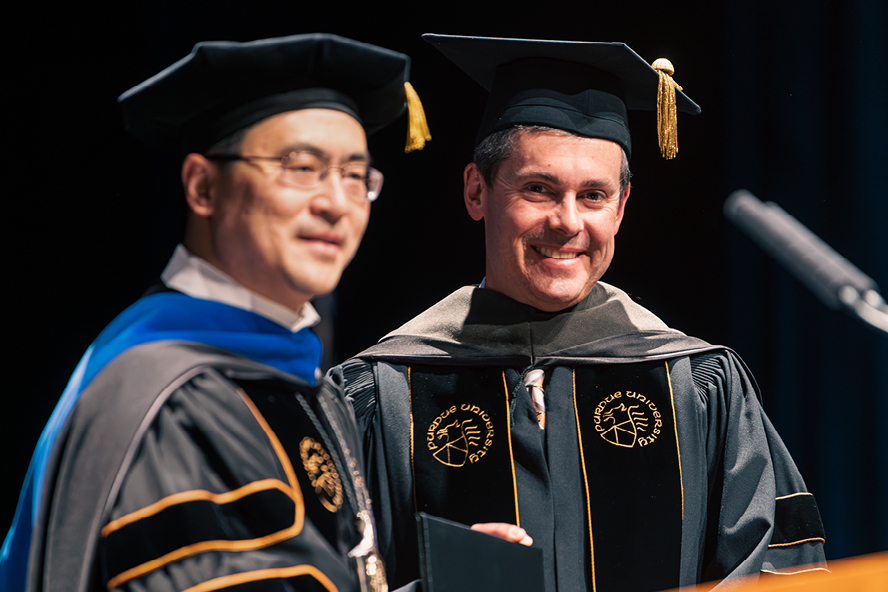
Lilly scientists and Purdue faculty and students have a tremendous opportunity to turn bold ideas into game-changing medicines, giving more people around the world a chance at better health.
Dave Ricks BS industrial management ’90
In 1886, Eli Lilly and Company hired its very first chemist, Ernest Eberhardt — Purdue’s top graduate from the then-new School of Pharmacy — to lead the company’s first research program. Eberhardt helped shape the early days of drug discovery at Lilly, opening the doors for countless Purdue students to learn, grow and work at the company, including current Eli Lilly and Company CEO Dave Ricks (BS industrial management ’90).
“As a Purdue graduate, I am proud of the university’s success and even more proud to see how the partnership between Lilly and Purdue strengthens both institutions,” Ricks says.
Continuing the momentum
In 2017, Purdue and Lilly entered a strategic collaboration to accelerate the discovery and development of new medicines. Today, over 50 researchers and more than 60 graduate students collaborate with Lilly scientists in the Eli Lilly and Company and Purdue University Research Alliance Center (LPRC). Current focus areas for the LPRC include:
- genetic medicine — using our own biologic building blocks to unlock new pathways to treatment and potentially cures
- intrathecal drug delivery — delivering medications directly into the spinal fluid to treat central nervous system conditions
- nanoparticle drug delivery — using microscopic particles to improve the delivery and effectiveness of drugs in the body
Kurt Ristroph and his lab work within the LPRC on developing nanomaterials and nanoparticle formulations — extremely small carriers that move medicine throughout the body (about 1,000 times smaller than the width of a human hair). Ristroph and his team of 20 postdoctoral scholars, graduate students and undergraduate students are especially focused on scalability and manufacturability in nanoparticle development.
“We’re working to develop reproducible large-scale manufacturing techniques for these nanoparticle formulations for a lot of different drugs, for a lot of different diseases and for a lot of different routes of administration,” Ristroph says.
This focus on real-world application allows researchers like Ristroph and scientists at Lilly to create next-generation drug products that can be manufactured at scale. “That’s what makes Lilly a great partner for my group, because the work is so industry-oriented,” Ristroph says.
Lilly has also collaborated with Purdue to build out tomorrow’s workforce in drug development. The Lilly Scholars at Purdue program is supported by a $42.5 million investment that awards up to 100 scholarships each year for talented undergraduate students who are interested in driving innovation in pharmaceutical research and manufacturing.
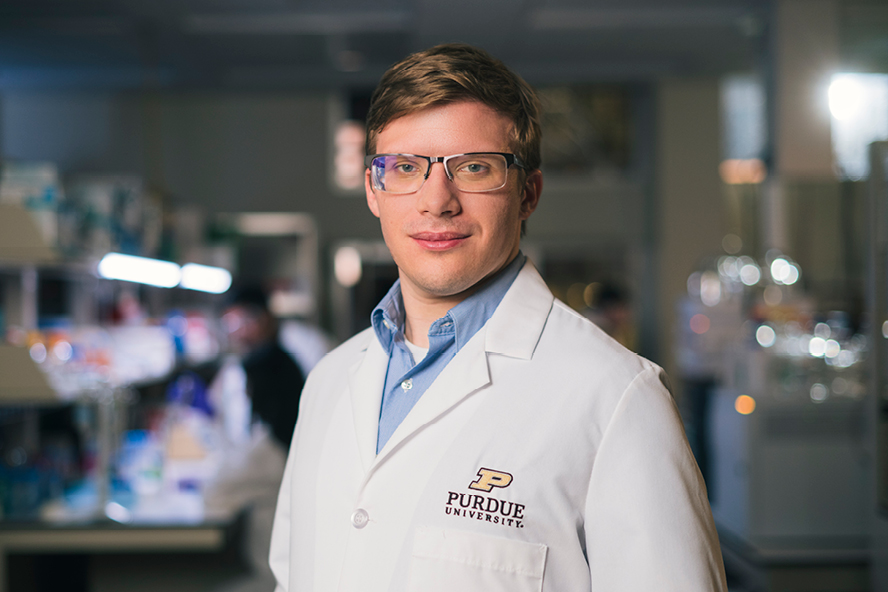
Companies like Lilly can help researchers define the scope for real-world hard problems. If we come up with a solution for a properly defined problem, that maximizes the chance that it can be translated by the company into a product that helps the patient.
Kurt Ristroph Assistant professor of agricultural and biological engineering, chemical engineering (by courtesy)
These Lilly Scholars have the unique opportunity to complete a paid Lilly internship, participate in coursework on pharmaceutical careers and engage with Lilly leaders for networking, mentoring and professional development.
“This partnership for talent development is essential for Lilly as we embark on unprecedented growth that requires expertly trained professionals,” Ricks says.
Purdue, Lilly and pharmaceutical company Merck & Co. Inc. recently collaborated to announce the launch of the Young Institute Pharmaceutical Manufacturing Consortium. The consortium is a collaborative effort to pioneer advances in making medicines with a focus on developing manufacturing technologies that will ensure quality, safety and compliance.
Making life better for millions around the world
Both Purdue and Lilly recognize that collaboration between academia and industry is essential for turning research into real-world impact that contributes to the evolution of medical science.
“One of the ways giant leaps happen is when research gets translated. Companies like Lilly are the ones that do that translation,” Ristroph says. “My academic research can be as industry-oriented as I want, but unless a company picks it up and runs with it and is willing to take a risk on it, at the end of the day, the work we do isn’t going to help patients.”
Purdue’s strengths in both pharmacy and engineering, along with support from Lilly, uniquely position the collaboration to support every phase of drug development — from the discovery of a molecule to the creation of effective formulations that turn that molecule into medicine and finally to the development of methods to manufacture and deliver the drug at scale.
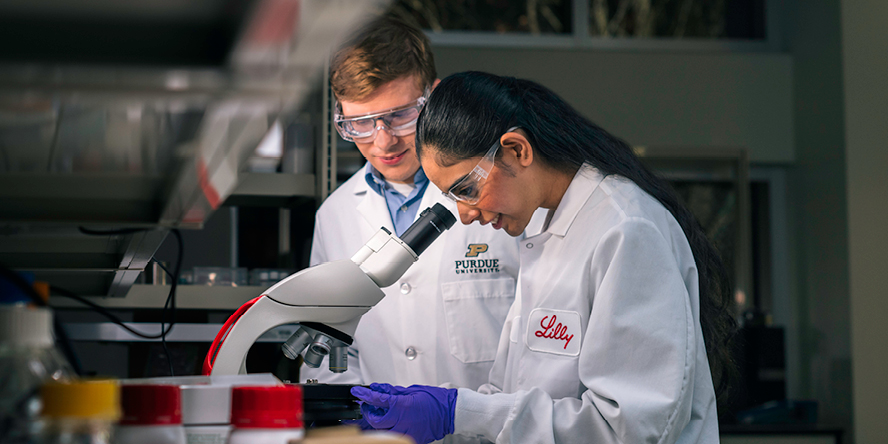
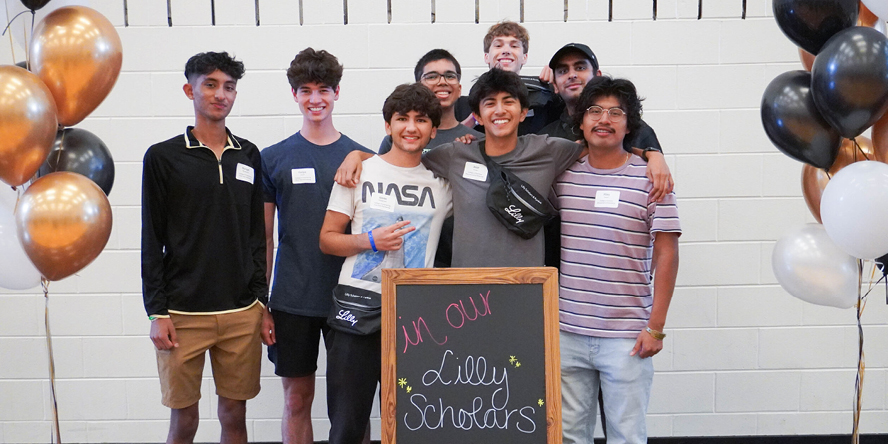


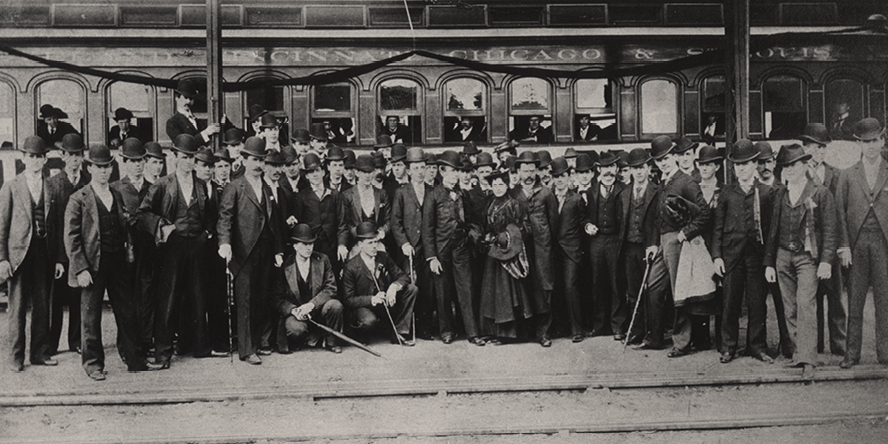
“Companies like Lilly can help researchers define the scope for real-world hard problems. If we come up with a solution for a properly defined problem, that maximizes the chance that it can be translated by the company into a product that helps the patient,” Ristroph says. “That’s a recipe for giant leaps, I’d say.”
By continuing to pursue collaborative research, scientific expertise in biology, pharmaceuticals and engineering, Purdue and Lilly hope to make life better for millions more people around the world.
“Together we’ve helped turn scientific discoveries into practical, lifesaving therapies,” Ricks says. “With demand for our groundbreaking medicines continuing to grow, we’re forging ahead to advance scientific research and attract top talent here in Indiana.
“Lilly scientists and Purdue faculty and students have a tremendous opportunity to turn bold ideas into game-changing medicines, giving more people around the world a chance at better health,” Ricks says.
Breaking the cycle: Purdue Global gave me a new beginning
Yvette Martinez, veteran of the Marine Corps and Air Force, believes in a better world for the next generation
Yvette Martinez recalls writing a paper in third grade about why she wanted to be a Marine when she grew up. She does not remember, however, how she even would have known what the U.S. military is, let alone any particular branch.
But somehow, whether it was through a teacher or a commercial or any other way it could have gotten into her head, she knew Marines were protectors. And in pure defiance of her tiny size among other 8-year-olds, Martinez had always been a protector.
Having faced abuse as a child, she learned a protective instinct earlier than most.
“I was always that kid — if I saw somebody else getting hurt, I would run toward it,” she says.
So when she graduated high school at 17, the only part of her future she felt sure of was joining the Marine Corps. She did have a secret, second dream that military service could make possible. But as a first-generation high school graduate, she was nervous to indulge those hopes.
“I didn’t know what my options were. I didn’t even know if I was smart. I didn’t even know how to apply. But I always wanted to go to college,” she says. “I remember one time using someone’s computer to apply for school, but we didn’t have the $50 fee. So I just didn’t do it.”

From there, to the Marines, through multiple deployments, through a transfer to the Air Force, she still quietly dreamed of earning a college degree.
And now Martinez has just crossed the stage at Purdue Global commencement for the second time, this time to accept her master’s diploma. Her whole family — her sons, mom, aunt and sisters — were there to watch family history being made.
Finding the opportunity for a new dream
“I’ve only had two real jobs as an adult — military and law enforcement,” Martinez says.
But whether she was deployed in Iraq or Afghanistan as a Marine, writing policies for her local sheriff’s department, training troops in the Air Force or even coaching her sons’ baseball and soccer teams, a common thread emerged. She realized she loved teaching. And as someone who had lost some friends in combat and seen others injured on the job, she knew the dangers of her job all too well. The urgency to create a backup plan began to build.
“I would love to teach criminal justice at the college level. That’s what I know, and I think I’m good at it. I don’t want to leave my job, but I enjoy teaching so much. Why not teach something I enjoy?” she says.
Martinez started out trying to balance classes at a brick-and-mortar community college with motherhood, coaching and full-time work. She was making it happen, but it was a heavy struggle. Then a colleague showed her how much more manageable the student experience could be.
It’s more than a comeback. It’s more than a feeling of accomplishment. I became me. I am me now.
Yvette Martinez
BS liberal arts ’20, Purdue Global
MS education ’24, Purdue Global
When Martinez saw her colleague was in school, she immediately related — sharing her own experience, knowing how much commitment was necessary while working full time and raising kids. Her friend agreed but mentioned how much easier Purdue Global’s online platform made it to balance her responsibilities.
“I had no idea Purdue Global was an option!” Martinez says.
Later, Martinez happened to notice her friend logging on and looking through her Purdue Global course materials. The first thing she observed was how straightforward and well-organized the information appeared, and her friend affirmed that this was indeed the case.
“I applied the next day,” Martinez says.
Breaking the cycle
The future has started to come into sharper focus for Martinez. Since teaching college courses remains on her bucket list, she moved on to a master’s program in education with Purdue Global after she finished her bachelor’s in liberal arts.
There was something therapeutic in knowing she was not only academically capable and working toward something she loved, but she found her studies a crucial component of a much larger goal. As she works with the next generation — whether they’re her kids or the ones she coaches or encounters at work — she’s steadfast in her belief that the generational cycle of abuse ends with her.
“It’s not just my own kids; it’s the community,” she says. “And there’s so many kids out here struggling, either in poverty or who don’t have the same opportunities. I’ve done my best to get out there, volunteer, speak about my past, work with kids who come in here through the juvenile system. I let them know there are opportunities, but you have to want them enough. I had to be determined that no, I’m not putting up with that behavior. That’s not what I want. I want this life, and this life is what I’m going to get.”
She’s worked for that life and has truly earned it — from abandoning her first application attempt because she couldn’t afford the application fee all the way to earning her bachelor’s. Now that she’s crossing the stage to accept her master’s degree, she says “comeback” describes part, but not all, of her experience.
“It’s more than a comeback. It’s more than a feeling of accomplishment,” she says. “I became me. I am me now.”
I was always that kid — if I saw someone else getting hurt, I would run toward it.
Yvette Martinez BS liberal arts ’20, Purdue Global
MS education ’24, Purdue Global
5 things that make Purdue Global a great starting point for your comeback
Recent grad Kevin Kohn explains why he recommends Purdue Global to working adults — and why he thinks you can be successful
Kevin Kohn (BS psychology ’23, Purdue Global) is no stranger to setbacks and knows what it’s like to live with regret. But Kohn says if he can conquer them, so can anyone.
As someone who has lived all his life with cerebral palsy and endured multiple surgeries — one of which eventually cost him the ability to walk — Kohn is full of charisma and sees roadblocks as challenges to overcome.
Shortly after he realized his wheelchair was going to become his way of life, a chance encounter with a basketball coach led him to the wheelchair basketball circuit. Years later, he briefly crossed paths with teenage phenom and fellow Purdue Global student Rose Hollermann, who would appear at four Paralympics Games and help Team USA win gold, silver and bronze medals.
Like Hollermann, Kohn’s anything-is-possible attitude has led him to another opportunity: Purdue Global.
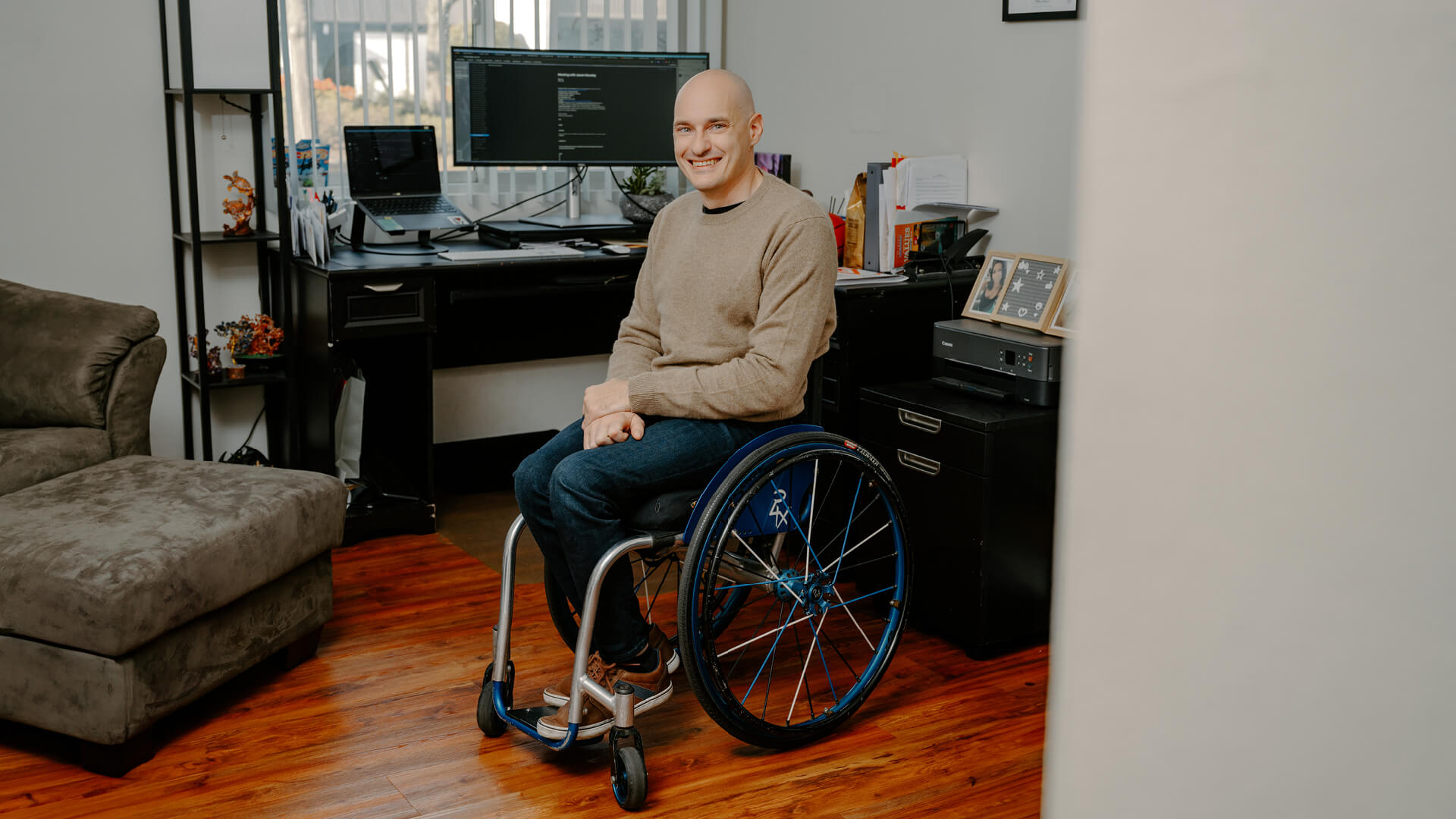
As someone who was working full time and had some college credit, Kohn says earning his degree with Purdue Global was the perfect fit. Find out below why he knows you can do it, too.
- Purdue Global understands working adults. Hesitation to go back to school is common and understandable — most people feel they can’t invest the time. Kohn says Purdue Global’s programs were designed with this in mind.
“You don’t feel overwhelmed or overburdened. You get a lot of that personal time in between. It’s a much better scenario for those who have an active outside life but still want to get or finish that degree,” he says.
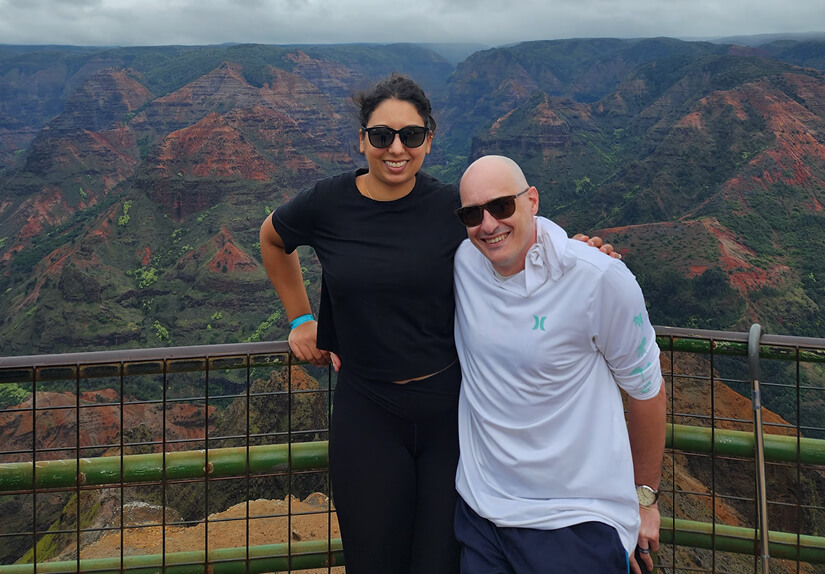
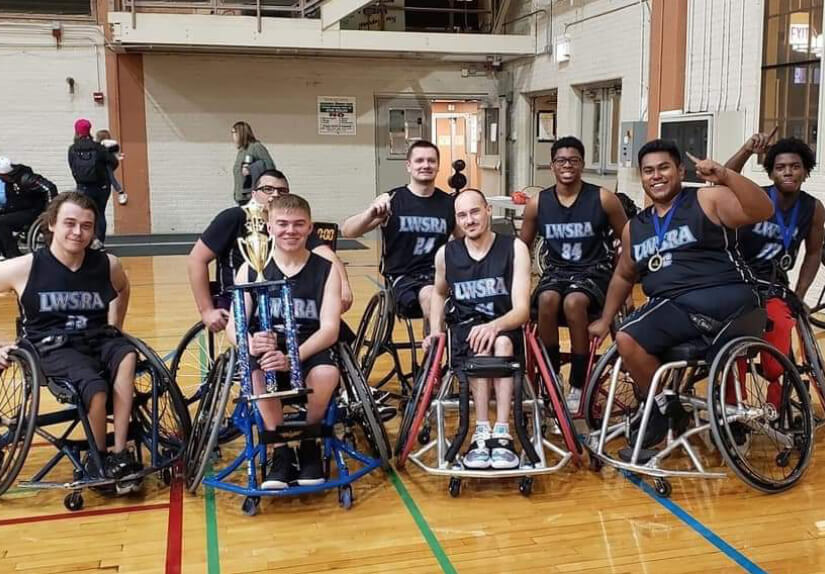
- You can get much-deserved credit. Purdue Global’s flexible transfer credit policy applies credits earned from outside institutions to as much as 75% of students’ undergraduate degrees. On average, undergraduate students fulfill nearly half their degree requirements with prior learning credits.
“All but a few of my prerequisites transferred over,” Kohn says. “Even a couple psychology courses came in, too. What started as a four-year course load for me turned into 2 1/2.”
And don’t forget: Purdue Global also offers course credit for life experience. Career, military and other nonclassroom learning may be eligible to earn credit toward a diploma.
- Education plans are customizable. With multiple start dates throughout the year and 10-week terms, students can start when they’re ready and take on the course load that’s manageable for them.
Kohn points out that the customized approach isn’t available at just any institution. “The pace of it is yours. You can set your own comfort zone, which helps you get to the finish line more smoothly,” he says. “A brick-and-mortar institution is going to have 12- to 15-credit terms.”
- The professors value student success. In the same way that the programs are built for working adults, Purdue Global professors know and understand the life stages their students are experiencing. Many of them have been adult students, too. And they’re known widely for caring about their students’ success during their Purdue Global journeys and beyond.
Kohn says, “The professors are some of the nicest, most understanding, empathetic teachers I’ve ever met. One professor I had, it was always positive energy. If something didn’t happen to go right on an assignment, she’d allow a redo. She’d see where a miscue was; she’d give points back for a particular area. So she was down to help you not only succeed, but succeed with the right understanding. And that was more than I’d ever had from an educational perspective.”




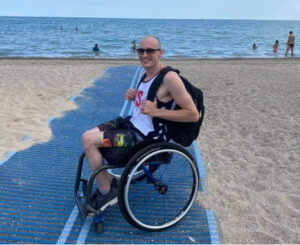
- You deserve it. Kohn says that although his degree in psychology has aided his career in sales, nothing compares to the sense of accomplishment and the confidence that comes from finally earning his bachelor’s.
“It was crazy because I was at a basketball tournament when that final grade came in; we’d just had this huge win,” he says. “I was like, ‘Hey, gang — I know we just won this game, but check out what I just made happen!’ I was more pumped about that than winning a tournament.”
In the end, Kohn wouldn’t trade his Purdue Global experience for anything. “My degree gives me new opportunities, leadership roles and beyond. I can see a bigger picture,” he says. “I can see the path forward.”

Best of the Boilermakers in 2024
Celebrating the top feats, milestones and moments of the year in Purdue Athletics
College athletics – and the competition it brings – is a collection of moments: some inspiring, some mundane, some frustrating, some exhilarating. For the student-athletes and fans alike, they become a collective set of memories.
So, by that measure, Purdue Athletics had a memorable 2024. From the winter and early spring run of men’s basketball to the Final Four to the December hiring of Purdue’s 38th head football coach, it has been a remarkable year.
To bring it all to a close for the year that was, here are some top moments in quasi-chronological order that unforgettably touched each Purdue team.








For the fourth time in school history, Purdue hosted the Big Ten Women’s Swimming & Diving Championships at the Morgan J. Burke Aquatic Center. The women’s diving crew had standout performances when it came time for the NCAA championships in mid-March. Sophie McAfee finished fourth in the 3-meter. McAfee, Daryn Wright and Maycey Vieta accounted for three of the top eight in platform diving at the meet held in Athens, Georgia.
The following week at the NCAA Men’s Swimming & Diving Championships in Indianapolis, Purdue continued to excel in diving. Three Boilermakers earned All-America status: Max Miller (1-meter), Jordan Rzepka and Holden Higbie (platform). Rzepka earned his third career All-America honor with his fourth-place finish, helping the Boilermakers land in the top 25 at the NCAAs for the 15th time since 2005.

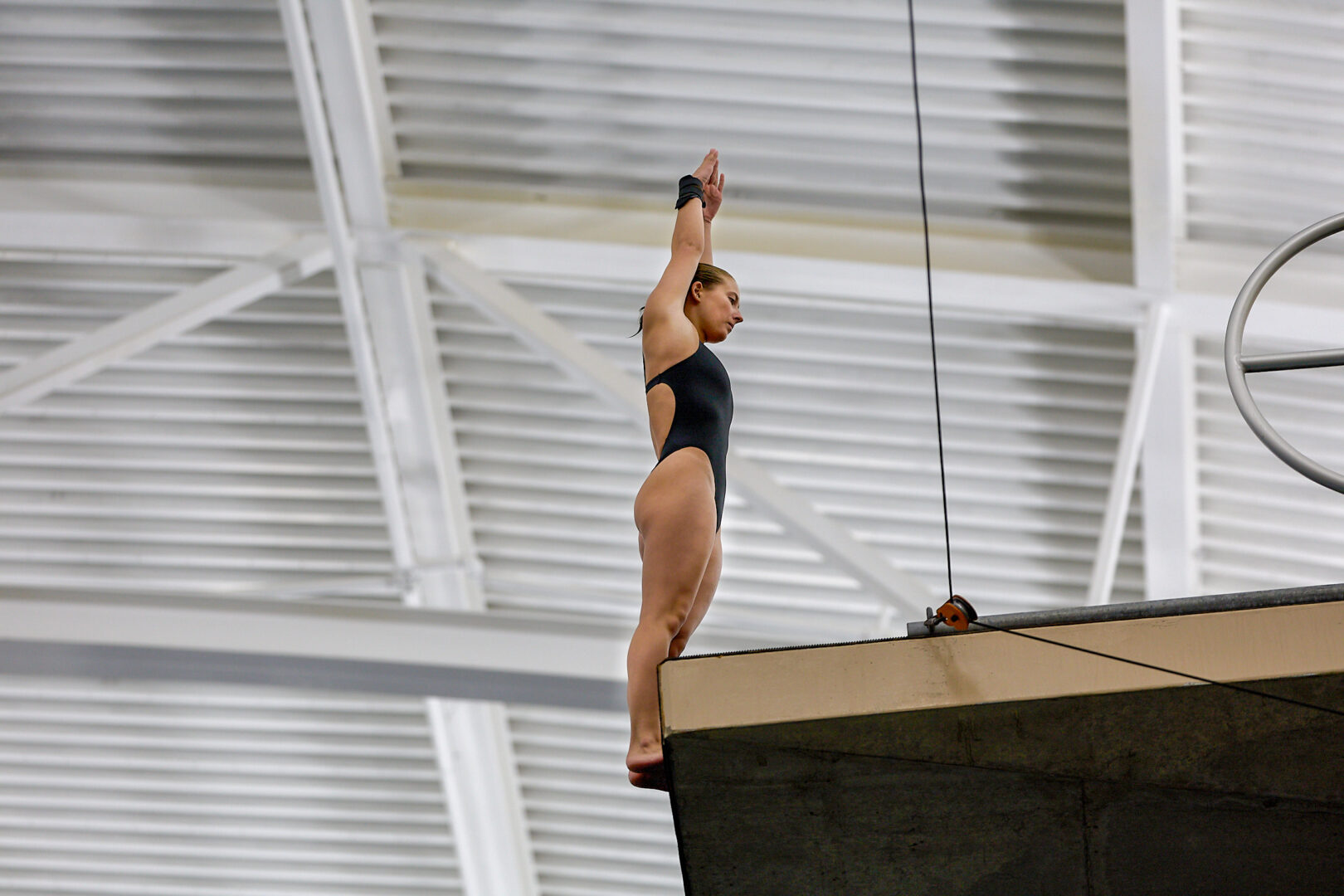
Also in March, coach Katie Gearlds’ women’s basketball team finished the 2023-24 season on a positive note with its third consecutive postseason experience, earning a quarterfinal spot in the WNIT while also enjoying a couple of capacity or near-capacity crowds in Mackey Arena.
Coach Matt Painter’s men’s basketball team’s magical NCAA tour through Indianapolis, Detroit and Phoenix was not only the event of 2024, but the Boilermaker team sporting accomplishment of the 21st century – with all due respect to the 2001 Rose Bowl and 1999 NCAA Women’s Final Four. Zach Edey becoming the first two-time national player of the year since the first term of Ronald Reagan was spectacular, possibly only matched by the fervor of the Boilermaker fan base throughout the entire season. The tens of thousands of Purdue fans in Phoenix provided a lifetime of sports experiences and camaraderie wrapped up in just one long weekend.

Later in the spring, Purdue baseball got everyone’s attention with a program record 11-game Big Ten winning streak and left a lasting impression on Chicago-area fans by visiting the Friendly Confines of Wrigley Field and pasting Northwestern on a rainy Chicago evening. Ultimately, the diamondmen posted their top win total in six years and a nine-win improvement from 2023.
Softball also progressed under first-year head coach Magali Frezzotti, posting the most Big Ten wins in 10 years and setting a school mark for consecutive wins in conference play.


The tennis teams were buoyed by strong individual play at the No. 1 spots. Stefan Simeunovic was named second team All-Big Ten, the first Boilermaker in five seasons to earn a spot on the all-league team. In the fall, Carmen Gallardo Guevara was the first Boilermaker to reach the NCAA Singles Championship since 2019. It was the sixth appearance ever by a Boilermaker in the singles tournament.
The golf teams accomplished something that both programs hadn’t done in seven years, with both qualifying for the NCAA Championships. The women’s squad finished the second season under coach Zack Byrd by producing two wins and four Top 3 finishes in 2023-24. The men were led by the highest individual finish in the NCAAs in 20 years, as Kent Hsiao placed 34th.


Highlighting the close of the 2023-24 sports season was Praise Aniamaka earning first team All-America honors in the triple jump at the NCAA Outdoor Track & Field Championships in Eugene, Oregon. It was his third All-America performance in as many years. Aniamaka, sprinter Cameron Miller and discus thrower Seth Allen all won Big Ten crowns earlier. Purdue made a mark at the NCAA Cross Country championships in the fall, with Douglas Buckeridge becoming the first Boilermaker to run sub-30 minutes, the ninth to finish in the top 50 of an NCAA Championship, and the third in five seasons.

Purdue track & field was well represented at the Olympic Games in Paris as Devynne Charlton was sixth in the women’s 100-meter hurdles, while Chukwuebuka Enekwechi placed sixth in the men’s shot put.
The highlight of the 12 Boilermakers competing in the City of Light was volleyball’s Annie Drews winning her second Olympic medal, as Team USA won the silver after winning gold three years earlier in Tokyo. The 3-meter synchronized diving duo of Tyler Downs and Greg Duncan took eighth, while women’s divers Wright, Jaye Patrick, and Vieta all finished in the top 25. The divers had the extra help for four-time diving medalist David Boudia, who served as an assistant coach for Team USA.
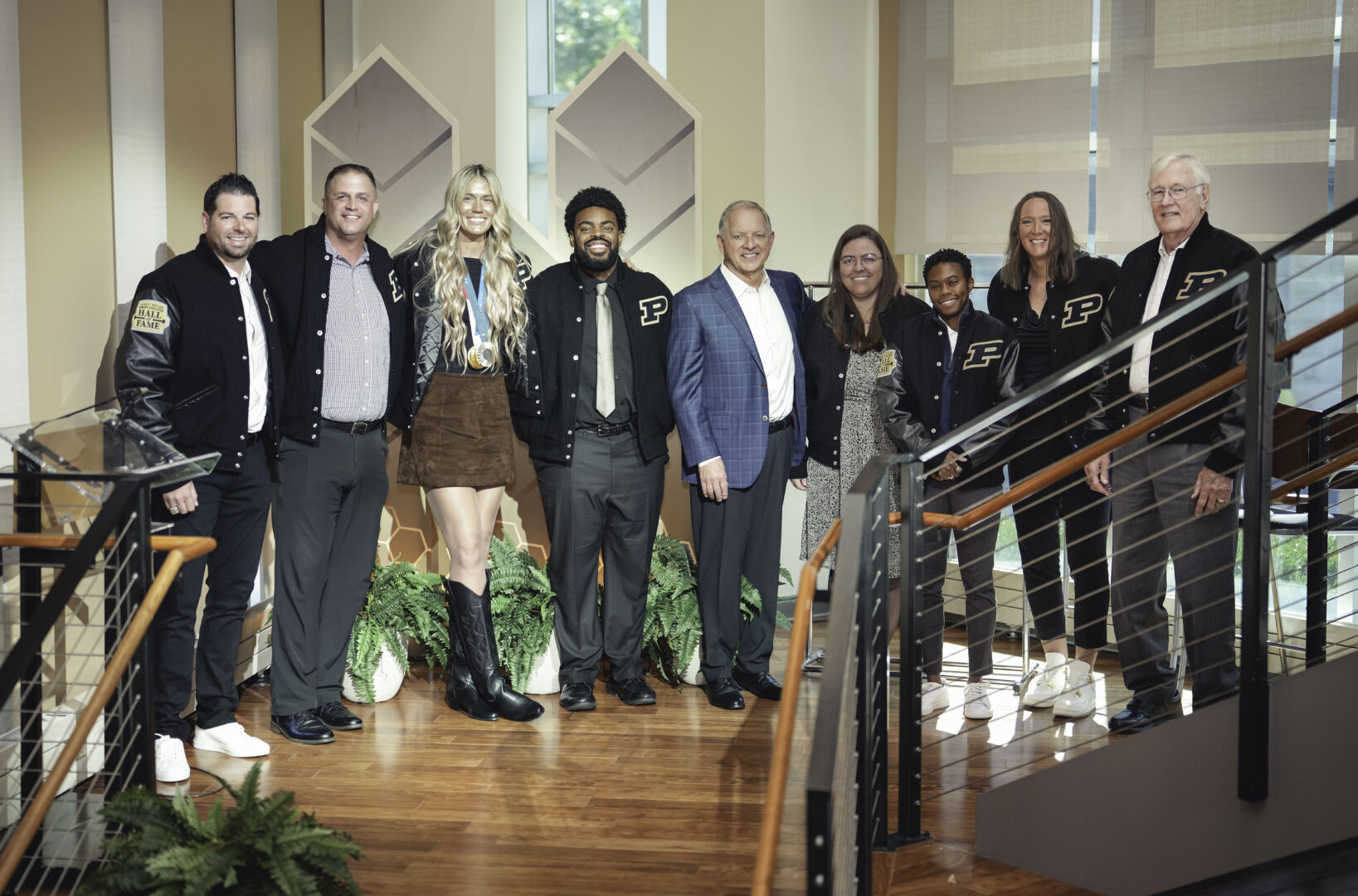
When the fall semester commenced, the soccer program was under new direction as Richard Moodie’s first Boilermaker squad. The improvement was noticeable as Purdue’s seven victories in 2024 were more than the program had in its last two campaigns combined (six). It was the most significant year-to-year improvement in seven seasons, providing much promise.

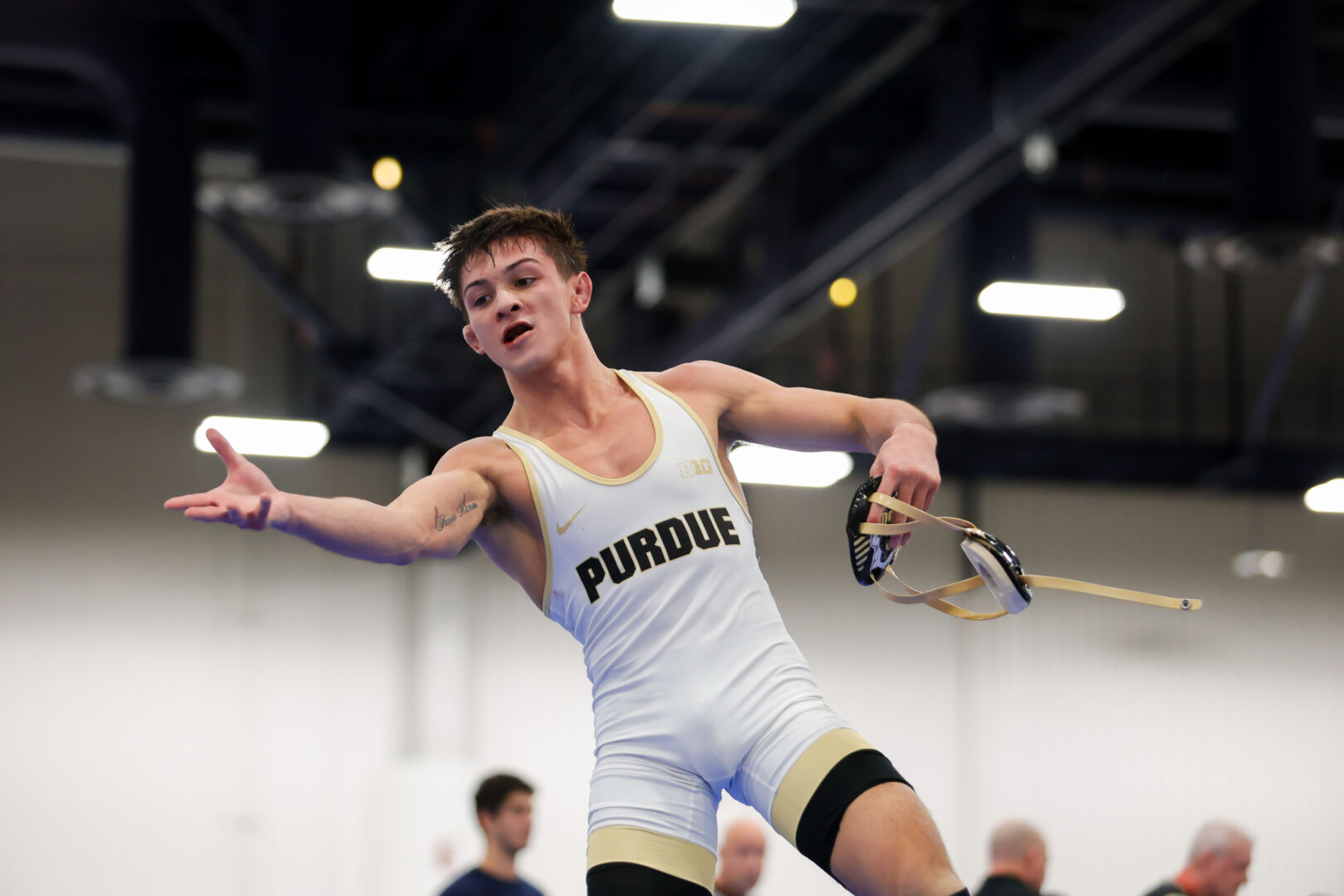
Wrestling’s big moment in 2024 came late, with No. 3-ranked Matt Ramos becoming just the fifth Boilermaker in school history to win the prestigious Cliff Keen Invitational. The 125-pounder also became the first four-time place winner at the event and hopes to make a run at becoming the first Boilermaker conference title holder in the rough-and-tumble Big Ten since 2004.
Speaking of a competitive conference, with the possible exception of wrestling, volleyball is as tough as it gets. And once again, coach Dave Shondell’s volleyball program capped off a highly successful season with their fifth NCAA Tournament Sweet 16 appearance in six years, spending much of the season ranked in the top 10 nationally. But what will make the 2024 campaign most memorable was the record-setting capacity crowds in Mackey Arena on consecutive Saturdays in late October against Indiana and Wisconsin, shattering the attendance mark for conference matches.

Hope and promise were keywords as the Purdue sports season ended in 2024. Hiring new football coach Barry Odom gave the Boilermaker faithful just that. Odom led UNLV to one of the surprise seasons in 2024 and a No. 20 ranking before taking the reins in West Lafayette. The gritty, no-nonsense coach knows there is work to keep Ross-Ade Stadium filled with fans, but his recent experiences in Vegas have the Boilermaker faithful optimistic as the calendar turns to 2025.

Written by Alan Karpick, a 1983 Purdue graduate who has served as publisher of GoldandBlack.com since 1996.
Bechtel makerspace facilities a boon to gift givers on a tight budget
At a Glance:
- Some Purdue students make gifts each year at the Bechtel Innovation Design Center.
- Among the most popular gifts to make are cutting boards, bowls, jewelry boxes and tables.
- The Bechtel Center is Purdue’s campus makerspace, which is free to use and open to all Boilermaker students.
Students from any major can bring their creative gift ideas to life at the Purdue makerspace — and they can do it for free
The gifts Silas Owen gave last year are going to be hard to top this Christmas.
He gave his basketball-fanatic dad an engraved wall hanging that featured an outline of Purdue’s Mackey Arena, adorned with historical facts about the iconic building.
He gave his mom an ornate cutting board made from four different types of wood arranged in an eye-catching chevron pattern.
He gave his girlfriend Lex’s parents a wall hanging in the shape of their home state, Alabama, that featured logos of the college sports programs they root for — Alabama and Auburn.
All were thoughtful, personalized gifts. And here’s the best part for a college student on a tight budget: They cost virtually nothing because Owen made them by hand at Purdue’s Bechtel Innovation Design Center.
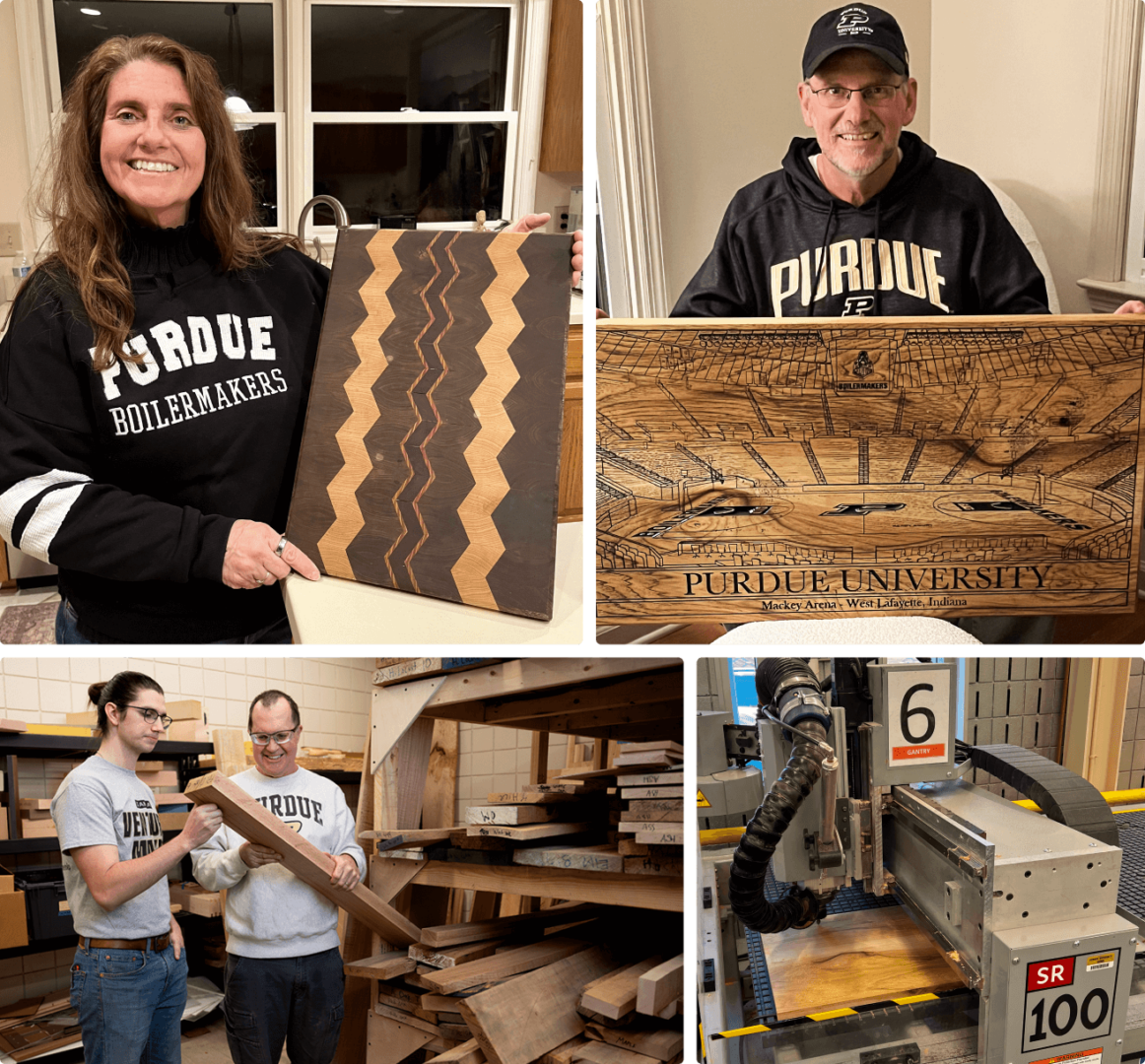
“I think it’s more meaningful for people to get something that you spent time working on, but it’s also a really good financial decision,” says Owen, a peer mentor at the Bechtel Center who graduated in December with a degree in mechanical engineering technology and a certificate in entrepreneurship and innovation. “Thinking that I’m going to spend $30 on a gift is not crazy at all. That’s a very normal amount of money to spend. Well, I spent $0 on most of the gifts that I made last year, and I was able to give them something personalized.”
Owen estimates that he is among roughly 20 to 30 Purdue students who make holiday presents for family and friends each year using the array of tools available at the Bechtel Center. He says the center has the capacity to accommodate many more if students have time available at the end of a busy semester.
Owen and the other peer mentors are happy to help fellow Boilermaker students learn how to operate the equipment, which they then use to create anything from 101-level items like cutting boards, bowls and jewelry boxes to more elaborate objects like furniture or chess pieces.

I think it’s more meaningful for people to get something that you spent time working on, but it’s also a really good financial decision.
Silas Owen
Bechtel Center peer mentor
Operation manager Dan Bollock (BSME ’87, MS forestry ’24) has even seen a student create a handmade engagement ring — no word on how that proposal turned out — during his time overseeing the 100 student workers who directly assist visitors to the campus makerspace.
“I love helping the students anyway,” Bollock says. “But when they’re making a present for their mom or dad, it’s just even more fun to help them.”
It’s important to note here that students do not need to have prior experience operating the equipment to use the tools available in the Bechtel Center. In fact, it’s more common for visitors to have no experience at all.
“I would say two-thirds of them come in here and don’t know too much, and that’s OK,” Bollock says. “We’re willing to train them.”
But once they walk through the doors for the first time, many are blown away by what they encounter. There are tools for woodworking, welding and composites manufacturing. There are 3D printers and laser cutters. There’s a fabrics lab to make and repair clothing. There is an electronics lab to make custom components.
I would say two-thirds of them come in here and don’t know too much, and that’s OK. We’re willing to train them.
Dan Bollock
operation manager, on student visitors to the Bechtel Center
Starting in the spring, there will even be blacksmithing equipment available, the result of two years of effort by Owen to get grant funding for the necessary materials.
“As the Boilermakers, I think we have an absolute need for blacksmithing,” Owen jokes.
And again, students can complete their projects at no cost thanks to the generosity of Bechtel Center sponsors who provided free or discounted equipment and the materials available in the facility’s stockroom.
“I’m still amazed every day that I can go downstairs and get a 4-inch round of stainless steel and it’s just free for me to use when it might be $150 for me to buy,” Owen says. “I think it amazes other people too because when folks come in here for tours, we’ll go in the stockroom and I’ll say, ‘And anything in here, you can use for any project, completely for free.’ And everyone’s always like, ‘What? Really?’ It’s a super cool reaction. I think that makes it even more accessible than it already is.”
Of course, the Bechtel Center was not created to be a place for students to make free holiday gifts. Named in honor of 1946 civil engineering alumnus Stephen Bechtel Jr., the former chair of the Bechtel Group LLC, the $18.5 million facility opened in 2017 to provide Boilermaker students — no matter what they may be studying — with a space to make anything they can imagine. They can build prototypes, implement innovative designs and even test ideas for new products that might someday become the centerpiece of a business venture.
Owen says student groups like the Purdue Orbital team and Purdue Space Program regularly use the Bechtel Center’s equipment to build essential pieces like carbon-fiber nose cones for rockets.





The facility’s array of resources so impressed Owen as a high school student that he says it was a primary motivator when he chose to attend Purdue.
“It’s tough to find any makerspace, really anywhere in the world actually, that is student-run to the level of the Bechtel Innovation Design Center,” Owen says.
A week before Thanksgiving, the facility’s various disciplinary labs were packed with students working on capstone projects. Owen was among them, having spent most of his recent free time working on his final project before graduation in December. His goal was to finish with enough time to spare that he’d be able to work on some of the Christmas gift ideas he’s had percolating lately — and he predicted that some of his fellow peer mentors would be in the same boat as fall semester neared its conclusion.
While the Bechtel Center might not have been introduced as a facility to be used for this purpose, it provides an unbeatable value proposition for students during the holidays or any other point on the calendar. If they’re willing to learn, their time is the only investment required to bring their ideas to life.
‘Space is for everyone’
SpaceKids Global’s active-learning opportunities encourage children to consider careers in STEM — and in space
Sharon Hagle still recalls the excitement of the moment in 1961 when an administrator announced over her West Virginia school’s public-address system that Alan Shepard had just become the first American to travel into space.
She never imagined at the time that she would also go to space someday, much less that she’d get there aboard a rocket bearing Shepard’s name.
But as she and her husband, Marc (BS electrical engineering ’71, MS industrial administration ’72), stared out the windows of Blue Origin’s New Shepard rocket in 2022 during the NS-20 suborbital flight, they were inspired to share this awe-inspiring experience with others.
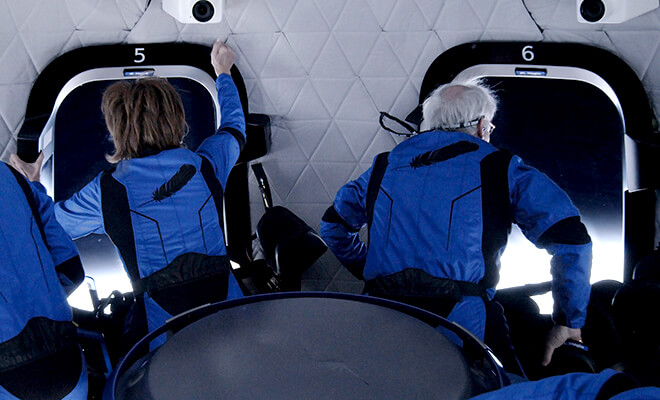
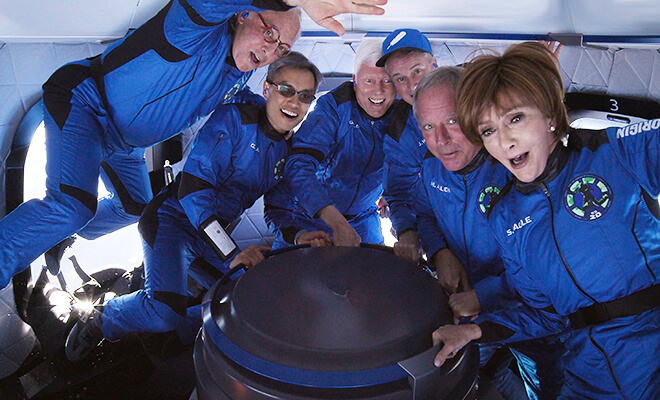
“When you have the opportunity to look down on Earth and see how fragile it is, it really does take your breath away, and it changes you,” says Sharon, founder and board chair of SpaceKids Global, an organization that encourages elementary students to consider careers in space exploration and technology. She and Marc are now two-time space travelers, having participated in Blue Origin’s NS-28 flight in November 2024.
“If you talk to any person that has left this planet and had that unique opportunity, every one of them would say that it changes you, and you just have this need to come back and make the Earth better.”
If you talk to any person that has left this planet and had that unique opportunity, every one of them would say that it changes you and you just have this need to come back and make the Earth better.
Sharon Hagle
Founder and board chair of SpaceKids Global
Addressing a societal need
So that’s exactly what she did, interacting thus far with nearly a million students globally through speaking engagements and SpaceKids Global activities focused on STEAM+ (science, technology, engineering, art, mathematics and environment) learning.
Her goal is to inspire schoolchildren, especially young girls, to help meet the ever-growing need for workers in STEM disciplines. And she wants them to consider the career options that will exist in the future — perhaps on the moon, on Mars or beyond.
Many jobs that will exist in the future have not been invented yet due to anticipated technological advances. Before long, many of these types of jobs will exist far away from Earth, as well.
“How do we prepare these kids for all these new careers that are going to be presented by being in zero gravity or on another planet?” Sharon asks. “That’s something we need to think about.”

As a child in West Virginia, I had no idea that I would have this opportunity so early on in space exploration, and then to have a second chance at it.
Sharon Hagle
Founder and board chair of SpaceKids Global
Who can become a space explorer?
She also wants schoolchildren to think differently about what it means to be a space explorer, often repeating the mantra that space is for everyone.
When thinking about space jobs, some might instantly picture the scientists and engineers who historically have become astronauts, but future space travelers will come from every walk of life. They will be cooks who prepare food for fellow settlers in their habitat. They’ll be doctors responsible for keeping residents alive and healthy. And they’ll be welders whose expertise is necessary to construct vehicles capable of traveling safely through space.
“Every trade you have here on Earth will one day be duplicated off planet,” says Marc, president and CEO of Tricor International LLC, a real estate development firm based in central Florida.
The space explorers of the future will be single people as well as couples — an important aspect of the Hagles’ own space story, as they are the first married couple to travel beyond the Earth’s atmosphere aboard a commercial spacecraft.
Their NS-20 flight — Blue Origin’s fourth crewed commercial spaceflight — hurtled the six-person crew into space at a velocity of more than three times the speed of sound and reached a height of 66.29 miles above Earth. It was such a mind-blowing experience that the Hagles elected to do it again, if only to retain more of what they witnessed when peering into the vast expanse of space.
“You’re looking out these windows at the darkness — everybody describes the darkness of space being darker than anything they’ve ever seen — and you’re looking back at Earth,” Marc says. “And you’re looking at how thin the atmosphere is over the edge of Earth and how fragile that is. And guess what? Your energy level, your excitement level, is so high, you just don’t remember everything that’s going on.”
The Hagles returned to space Nov. 22, 2024, aboard Blue Origin’s ninth human spaceflight. The voyage made them the first married couple to travel to space twice.
“I would do it 100 times if I could,” jokes Marc, who as a former percussionist in the Purdue “All-American” Marching Band brought along a stuffed replica of the band’s Big Bass Drum on the NS-20 flight.
The experience also strengthened the Hagles’ resolve to remind children that when they say “space is for everyone,” the “everyone” could include them or any of their classmates.
The SpaceKids Global mission
Sharon had already founded SpaceKids Global by the time she and Marc first traveled to space — the organization debuted in 2015 — but her status as a Blue Origin astronaut creates a more powerful message when she tells children that they could travel to space someday, too.
“A point that I want the children to recognize is that you have no idea what you’re seeing today and how that’s going to propel you into whatever you do in the future,” she says. “As a child in West Virginia, I had no idea that I would have this opportunity so early on in space exploration, and then to have a second chance at it.”


SpaceKids Global encourages children to consider the exciting career opportunities that await them through a wealth of active-learning opportunities. To list a few:
- The organization has sponsored field trips for Florida Title I public school fourth graders to visit Kennedy Space Center.
- It collaborated with Blue Origin’s Club for the Future on a project that let participants of all ages send postcards to space aboard the New Shepard rocket.
- Two winners of SpaceKids Global’s “Why I Want To Go to Space” national essay competition were able to take a zero-gravity flight aboard a special Boeing 727 airplane.
- And most recently, eight children from across the country became members of the SpaceKids Press Squad, which allowed them to act as reporters while touring Blue Origin’s rocket manufacturing facility, visiting Kennedy Space Center, watching the Hagles’ recent Blue Origin launch from Mission Control and then interviewing the commercial astronauts afterward.
“This is what excites me: getting the kids involved,” Sharon said ahead of the flight.
Assisting in this endeavor is an honorary member of the NS-20 mission crew, the Hagles’ Pomeranian — Saba the Space Dog. Saba might have remained on Earth when the couple made their suborbital flight, but he’s often the star of the show when Sharon brings him into an elementary school classroom wearing his special astronaut uniform.
“Remember, my demographics are 5 to 12 years old,” she says, “and they are such sponges. They listen to everything. The room is quiet. You could hear a pin drop. And then we go into Q&A and the first question is always ‘Can we see your dog again?’ Blue Origin was kind enough to make Saba a spacesuit to match Marc’s and mine, so he was treated just like a dognaut.”

The Hagles have ambitious plans for SpaceKids Global’s future, expanding its reach far beyond the couple’s home base in central Florida and creating partnerships that will enable the organization to provide educational opportunities in students’ middle and high school years up through college entrepreneurial and internship programming.
“As we set those programs up, our geographic reach is going to increase,” Marc says. “We’ve done a very good job locally because we have the presence here and we have the capability here. We’re going to be able to expand that presence and that capability across the country.”
Expanding their legacy
When performing with the marching band during Purdue’s 1967 Rose Bowl victory, Marc could not have expected to someday contribute to the university’s budding reputation as a leading institution for space exploration. And yet he’s doing that very thing more than 50 years after graduation.
But even without space travel, Marc’s Boilermaker legacy would be secure thanks to his and Sharon’s commitment to paying it forward. Their philanthropic spirit is exemplified through their lead donation for the construction of Marc and Sharon Hagle Hall, the home of Purdue Bands & Orchestras, their funding support to the Purdue Astronaut Scholars, and Marc’s continuing role as a guest speaker in the Mitch Daniels School of Business’ real estate finance program.
And it’s most certainly evident in Sharon’s ongoing efforts to help others recognize that they can also travel among the stars.
SpaceKids Global became a primary sponsor of Purdue’s “Boilers to Mars” short film for precisely that reason. The Purdue-produced short film features three Boilermaker students who become the first explorers to travel to Mars — with the characters’ extremely different paths leading to the mission that reinforces the Hagles’ message about the wide range of roles humankind must fill in space.
“I’ve always told people when I’m speaking: going to space is the most emotional and spiritual journey you will ever take, and I think this film pokes you in how emotional it is and how it’s so exciting,” Sharon said on an episode of the “This Is Purdue” podcast recorded at the “Boilers to Mars” premiere.

In one scene from the film, a character named Bobbi works on a laptop adorned with a SpaceKids Global sticker, hinting that her interest in space originated with an early interaction with Sharon’s organization.
At the film’s premiere, Marc encouraged the Purdue students in attendance to follow through on their own ambitious interests and dreams. “It said in the [film] not to be afraid to be first,” he said. “[Virgin Galactic founder] Richard Branson said it a little differently: ‘If your dreams don’t scare you, they’re not big enough.’ So, think of what the future could be for you. Think what the opportunities are and what the benefits could be with an education that you get from such a wonderful university.”
‘My Purdue Global degree set me on a path to the life I always wanted’
Entrepreneurship was never Sienna Clawson’s vision, but experience sparked a passion that grew into a vital resource for moms
Sienna Clawson’s home is full of life wherever you look.
Two-year-old Sarah shows off two monarch chrysalises they’re watching. The family’s gentle giant, George, a cuddly goldendoodle, tries to get attention with nose nudges. Photos of Sienna with her husband, Brendon, and their four kids cover the living room wall. Torty the tortoise loudly munches lettuce a room away. And Sarah forgets about butterflies in favor of performing a series of belly flops on the couch.
The lively scene is not necessarily a surprise, considering that the two businesses Sienna runs are devoted to the holistic care of postpartum mothers and their newborns. But the fact that she’s built this life she always wanted — the family, the photos and the memories they hold, the bear-sized dog, the soon-to-be butterflies, the work she loves, the clear confidence she carries — defies every known statistic. Sienna and Brendon were teen parents.
And today, Brendon takes Sarah outside to play while Sienna pulls out a chair from her dining room table to talk about how she went from pregnant high schooler to Purdue Global graduate and successful entrepreneur.
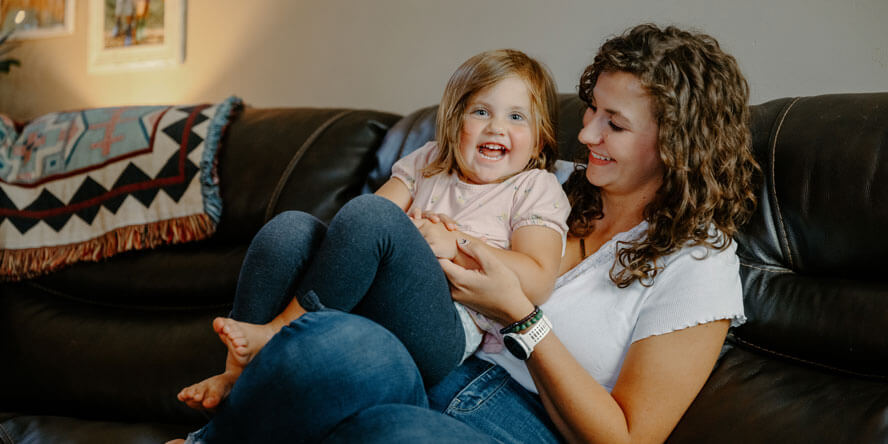

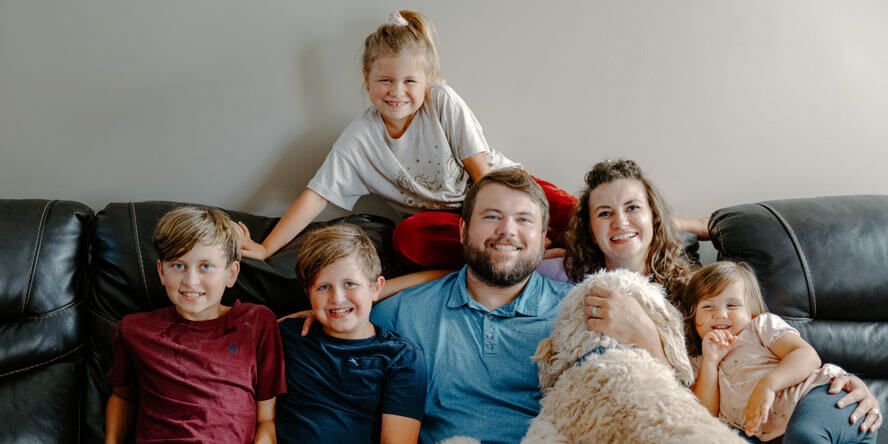

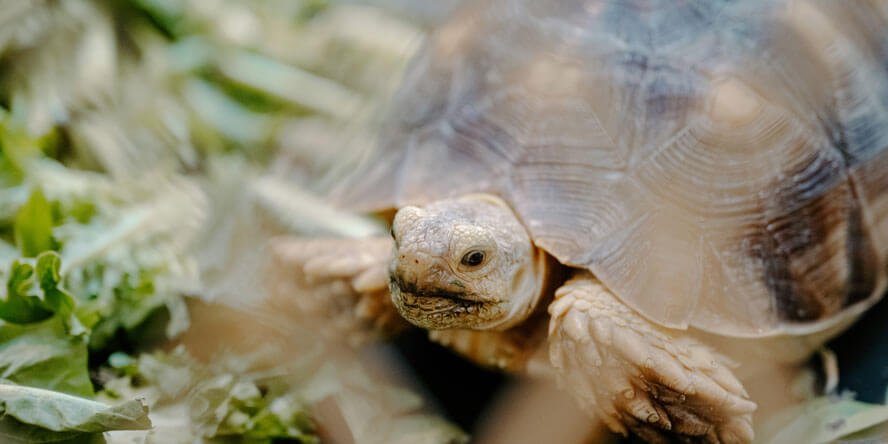
Beating the odds
Early in her senior year of high school, Sienna discovered she’d have enough credits to graduate in December, ahead of the rest of her class. So she weighed whether to graduate early or take some fun classes and enjoy the home stretch.
Ten days before December graduation, she found out she was pregnant, and her decision was made for her.
That August, their baby boy arrived the same weekend most of her friends moved into their college dorms. While her peers eased their way into adulthood by exploring career paths in college, Sienna was thrust into a new life as a grown-up and had to learn on the job.
She and Brendon were strong as ever, but the isolation was still overwhelming. She had all the medical care and support she needed throughout her pregnancy, but as soon as she gave birth, when she had more concerns and bigger questions than ever, somehow she suddenly felt like she was in the middle of a postpartum desert. The stress was unbearable, and she suffered from postpartum depression.
“It was really lonely,” she says. “I was so young. I didn’t have much help. I basically did it myself, and it sucked.”
Amidst all the struggles any new mother faces, plus depression, Sienna also endured the stigma of being a teen mom everywhere she went, whatever she did.
“Teen moms get a bad rap,” she says, tears springing to her eyes.
She takes a moment and a deep breath.
“There’s this stereotype that if you’re a teen mom, you’re irresponsible,” she continues. “So it was always our goal that we provide him with a life that never feels to him like it’s weighed down by the way we got our start.”
That’s why, in the young family’s earliest days, they gave everything they had to support each other and their new baby.

As residents of Lafayette, Indiana, Brendon (who is a couple of years older than Sienna and had already started his engineering degree at Purdue University’s campus in West Lafayette) opted to work full time while maintaining full-time student status. Sienna stayed home with the baby for a few months, but they needed another source of income, so she began bouncing around to different types of work.
Eventually, she settled on providing child care out of her home, but something was missing. She felt like she had the right story with the wrong angle.
“My husband sat me down one night,” she says. “And he said to me, ‘You seem lost.’”
It was during this difficult conversation that all the pieces started coming together for her.
“I started looking back on those early years, and I truly realized how much I had gone through by myself during postpartum and all the things that came with it. I asked myself and I asked Brendon, ‘Why? Why is nobody helping moms with newborns?’” she says. “I didn’t start a business because I like business. I started a business because I had to.”
She felt strongly that if she’d had professional support with breastfeeding, or if she’d had counsel and education on what to expect, her experience as a new mom would have been dramatically different. She would have been able to focus on bonding with her baby. She was sure the intense stress of trying to figure out everything by herself, in the highest-stakes situation of her life, was a primary factor in developing postpartum depression. If she could help new moms address those challenges, maybe their first experiences with motherhood could be more positive than hers.
First Expressions — a local business to offer birth photography and doula and lactation services — was born that day.
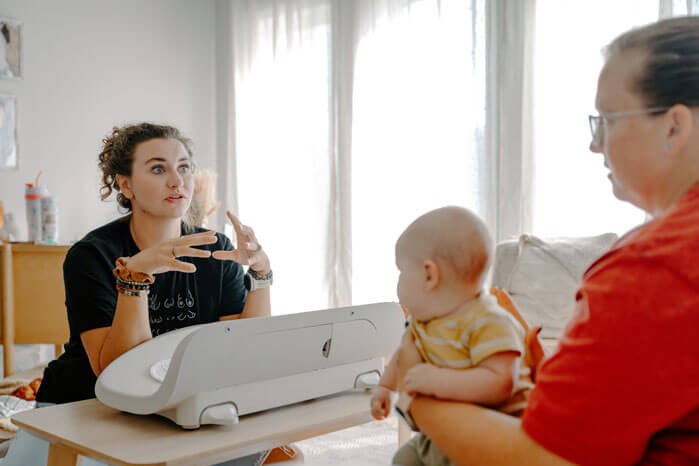
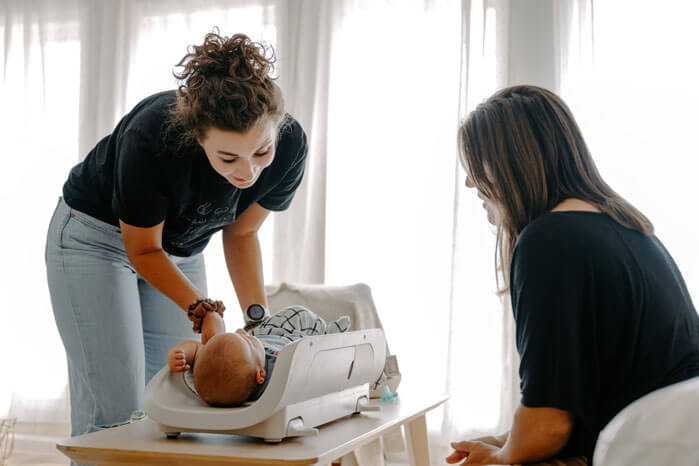
A comeback made possible with an online education
But in order to provide the kind of care that was so desperately needed, there was one big hurdle she had to find her way over.
“I needed foundational knowledge with a bachelor’s degree to be able to know if I wanted to get into a master’s program for lactation, but I never saw myself being able to finish a degree. The statistics of teen parents even getting a bachelor’s degree after they have children is really low,” she says.
She’s not wrong. According to data from both the National Conference of State Legislatures and Child Trends, fewer than 2% of teen mothers earn a college degree by the age of 30. With stats like that, she knew exactly how difficult it would be to come back — and now she and Brendon had four kids, not just one.
“I knew if I was going to be a respected resource in my community, I need those letters behind my name. People look for that, and they want to know where you got them. The Purdue Global name earns trust and respect,” she says.
Brendon was already a year deep into a second degree through a Purdue Global program in finance. Sienna saw firsthand the great experience he was having, so she took the leap. She began a bachelor’s degree in health and wellness from Purdue Global.
One of the first things she noticed was how engaged she felt.
“The health and wellness program at Purdue Global has blown my mind,” she says. “I love the live seminars; I love the structure of the courses. And there’s no fluff — all the information is pertinent. They get straight to the point. They know what you need to know, what you’ll need to apply in the field.”

She says the 10-week terms are short enough to be manageable, too, which is important for her motivation. And with the kids watching, she’s communicating daily — without words — that if she can do school, so can they.
“The kids know they can’t quit either; they know they’ve got this. We check on each other every morning. They ask me, ‘Hey, Mommy, did you finish your homework last night after we went to bed?’ Or when we’re looking at their report cards, they want to know what my grades are, too,” she says. “And if they’re going to be looking that closely, I better do it right so they know they can, too.”
Now, since crossing milestone after milestone, she’s just weeks away from the finish line. In the meantime, as First Expressions has grown in the services it offers, Sienna has partnered with a speech-language pathologist to begin a second business called Pediatric Wellness Group, which aims to be a one-stop shop for holistic care. Both businesses are rapidly becoming essential resources for the community.
Above all, nothing compares to what it feels like coming home from work every day — she says seeing relief in the eyes of new mothers makes it all worth it.
“There’s nothing better than knowing you’re truly helping somebody’s journey and setting them up for success,” she says. “Some people leave work and they’re like, ‘Thank God I’m done!’ But I leave every single appointment knowing that I’ve helped somebody. I leave work feeling like I have made a difference.”
I leave work feeling like I have made a difference.
Sienna Clawson
BS health and wellness ’24
Purdue Global
A late spouse’s Christmas dream realized
Tina Smith wanted to donate a Purdue Memorial Union Christmas tree. Tina’s husband, Darrell, helped fulfill that wish.
“She’d just be ecstatic. She’d want to be there. She’d want to see it cut down. She’d want to be at the Union to see it come in. She’d want to be there to watch it being decorated. She loved all holidays, but Christmas was her favorite.”
Darrell Smith, a maintenance technician at Purdue for the last 33 years, knows exactly how his late wife, Tina, would have reacted to the news that her wish had come true. Tina loved visiting the Purdue Memorial Union Christmas tree each holiday season — so much so that she dreamed of contributing to the tradition herself someday.
Eight years after Tina passed away, the Purdue Student Union Board accepted Darrell’s offer to donate a 32-foot spruce from his backyard that he and Tina picked as a potential Purdue Christmas tree more than a decade ago.
The Smiths’ tree was the featured attraction when Purdue kicked off its holiday festivities with a tree-lighting ceremony on Nov. 25, in the PMU Great Hall.
“I was pretty happy when I heard,” Smith says. “I’m really an emotional guy. It makes me so happy that my wife’s getting what she wanted.”
The PMU Christmas tree holds a special place in many Boilermakers’ holiday traditions, but that is especially the case for the Smith family. For most of the past three decades, Smith has taken care of the massive trees that have resided in the Union’s Great Hall during the holidays.
He’s helped yank them in the front door. He’s helped raise them into standing position. He’s helped students decorate them. And he’s spent untold hours watering them in an effort to keep them looking beautiful all season.
It can be a thankless job, but his Purdue colleagues are well aware of the special care that Smith takes to make sure the season is merry and bright for the Boilermaker community. So when Smith’s boss, Luke Versprille, learned about his desire to donate a tree in his late wife’s memory, he made Smith’s goal his own.
“Luke and I hit it off from the day I met him. More than being my boss, he turned out to be a friend who saw something I wanted and tried to make it happen,” Smith says. “He said it was one of his goals that, before I retire, he wanted to get one of my trees in there.”
It was an easy decision for Versprille, Purdue’s director of auxiliary services operations.
“For over three decades, Darrell has poured endless amounts of effort and energy into helping mold the Purdue Memorial Union into what it has become today,” Versprille said. “His love and care for the building and, more importantly, the people who visit embodies the spirit of Boilermaker hospitality. Having Darrell’s tree as the centerpiece for the holidays is such a beautiful way for us to recognize what makes this place so special: its people.”
One of Smith’s favorite responsibilities at Christmastime is helping students decorate the tree, preparing it for the tree-lighting festivities. Of course, that work is a bit more meaningful this year.
When the lights flickered on for the first time, Darrell and his children were in attendance to see Tina’s dream finally realized.
“It was her idea after going there for so many years and looking at them and seeing that we actually had that type of tree out here in our backyard,” Smith says.
“She really wanted to be able to donate one. I just wish she could be here to see it.”
She’d just be ecstatic. She’d want to be there. She’d want to see it cut down. She’d want to be at the Union to see it come in. She’d want to be there to watch it being decorated. She loved all holidays, but Christmas was her favorite.
Darrell Smith, on how his late wife, Tina, would have reacted when Purdue selected their tree as the Purdue Memorial Union Christmas tree
Why I’m a proud Purdue Global alum
Learn about Craig Dockstader’s journey toward his online degree in communication and his inspiring words of support
Craig Dockstader is one of Purdue Global’s proudest alumni. From interacting with social channels to being an advocate for online learning, he loves to show his support. Learn about his journey, to his bachelor’s degree, told in his own words, and how Purdue Global has helped him move forward in his career. Plus, discover his advice about what it means to be a successful online student and graduate.
I had already seen my wife finish her degree. My oldest child had finished hers, and there I was stuck in limbo. I was getting to the point where getting my degree was something I wanted to do. At the time, I was in law enforcement, but I then transitioned to working for a waste and recycling company that had an education benefit. It gave all types and levels of employees an educational benefit. My wife and I also had a lot of friends recommending the great opportunities with Purdue Global. So I did a lot of research. I figured this is the perfect fit.
It’s going to help me meet my educational goals. It’s going to help me with my career advancement. I’m going to feel like I have the support to continue my success within my career or whatever I do in life. I wanted the best bang for my buck, so to speak, and I’m happy to say that I have gotten everything that I’ve asked for and more. I feel it did so many great things for me and my family, even though I earned that degree later in life. It just shows you that it’s never too late.
I have gotten everything that I’ve asked for and more.
Craig Dockstader BA communication ’24, Purdue Global
I have two daughters, a granddaughter and a grandson. They know that when I commit to something, I’m all in. I don’t do anything halfway. So they knew when I said, “Hey, I’m going back to school. I’m going to graduate with highest honors. I’m going to get those gold cords because that’s my goal.” There was nothing stopping me, and then for them to see it, they’re like, “Wow. You really did it.” I did.
It’s hard not to get emotional about it now. Graduation was surreal. You put in all those hours, and you work so hard to make your goal a reality. Seeing my wife and my youngest daughter in the stands cheering me on in Dallas, that was a big deal. I showed my kids and my coworkers that it’s never too late. I couldn’t have thought of a better way to walk across the stage other than raising my hands like Rocky. It felt so triumphant.
I showed my kids and my coworkers that it’s never too late.
Craig Dockstader
BA communication ’24, Purdue Global
Since earning my degree, it has helped me with my team and within my career. I’ve been with my company for seven years, and the improvement is extremely noticeable. I’m a market-area safety specialist, so I do a lot of training, teaching and educating. If we’re educating our employees, then they feel inspired to do more because they’re feeling valued. I wanted to be an effective communicator, so I chose to pursue my bachelor’s in communication. I was a terrible speaker before my degree, but now I have a better understanding of what the other person needs. I don’t know many people who can say that they utilize their degree every day, but I know that I do. I’m very passionate about it.
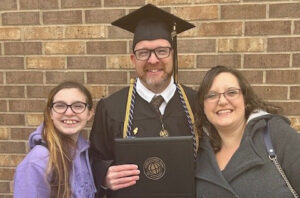

To other working adults who are hesitant about going back to school, I just want to say that it’s never too late. Don’t think that your age is a restriction or the reason why you can’t keep going. You’re going to get back what you put in. Don’t give up when it’s hard. I’ve been supported from start to finish, and I’m still supported even though I’ve graduated. I still have weekly contact with my professors because I’ve built friendships
If you’re wondering if it’s right for you, they even give you a three-week, no-cost trial. Take advantage of it and see if it is for you. I’ve done the research; I’ve saved the time for you. Just remember, you won’t find an online university that supports you as much as Purdue Global does. So just take the time, take the step, make that progress and go forward.
Photos that especially a Boilermaker could love
This Purdue fan cave features visual evidence of a family’s memorable interactions with famous Boilermakers
Rob Stanley has lived and worked all over the world, and yet visiting one particular location always elicited childlike enthusiasm.
Stanley (BS technology ’88) relished any opportunity that he and his wife, Cheryl (BA education ’88), could take their daughters, Laura and Beth, to Purdue, where they met as undergraduate students.
“We used to take the girls when they were younger back to Purdue whenever we could,” says Rob, who grew up in Kokomo, Indiana, before attending Purdue on an Air Force ROTC scholarship. “We were hardly ever in Indiana, and it was really special to us to go back and show them where we grew up and where we met and tell them the stories. They could tell that both of us just came to life anytime we’d go back to Purdue. I’d get so excited that I’d do some pretty stupid things.”
More on those things in a moment. Years later, the most important aspect of those stories is not whatever light trespassing might have occurred, but the memories that remain for the Stanleys and their daughters. Those moments are memorialized on the walls of Rob and Cheryl’s Purdue-themed fan cave in the upstairs rec room of their Rockwall, Texas, home. Affectionately known as “The Boiler Room,” it houses memories and mementos from their time at Purdue and from Rob’s 25-year career in the Air Force.



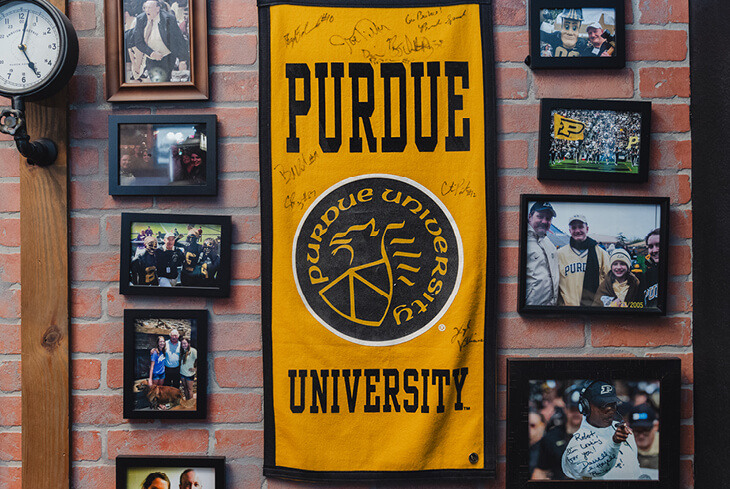
There are photos of family members with Purdue luminaries like President Emeritus Mitch Daniels and C-SPAN founder Brian Lamb, the university alumnus for whom the School of Communication is named. And like many Boilermaker fan caves, there are pictures featuring numerous Purdue football and basketball coaches.
But what sets the Stanleys’ fan cave apart from others like it are the questions visitors might be inspired to ask after viewing some of the photos on display.
For starters, how did the Stanleys wind up in legendary Boilermaker basketball coach Gene Keady’s office during a visit to campus?
Or, a few years later, how did they meet current Purdue basketball coach Matt Painter and essentially enjoy a private viewing of a Boilermaker basketball practice at Mackey Arena?
Or, in perhaps the story that beats them all: During her own days as a Purdue student, how did Beth and a friend manage to spend the night in the guesthouse of former Purdue football coach Joe Tiller and his wife, Arnette, after the Tillers retired to Wyoming?
To answer a couple of those questions, it’s time to explain those “stupid things” Rob referenced.
‘Where are you gonna go to college, little girl?’
The Keady story starts innocently enough. On a 2004 trip to Purdue, Rob and Beth — over Cheryl and Laura’s protests — decided to sneak onto the field at Ross-Ade Stadium to grab a few blades of grass from the football field that are still on display in their Boiler Room. Rob then decided to test his luck further, trying multiple doors at Mackey Arena until finding an open one that provided access to the basketball arena.
The family wandered around the darkened building for a bit. The girls posed for a pic in front of the women’s basketball team’s locker room door. Rob found the spot on the playing surface where he figured Keady might sit during a game and took a seat. All the while, Cheryl was none too pleased by her husband’s willingness to trespass with their girls in tow.
Eventually a maintenance person came across the Stanleys and ushered them toward the exit, but on their way out of the arena, they bumped into Todd Foster, who had played basketball at Purdue several years earlier. Foster chatted with the family about what they were doing in town, then posed for a photo with them and made an offer that even an angry Cheryl couldn’t turn down.
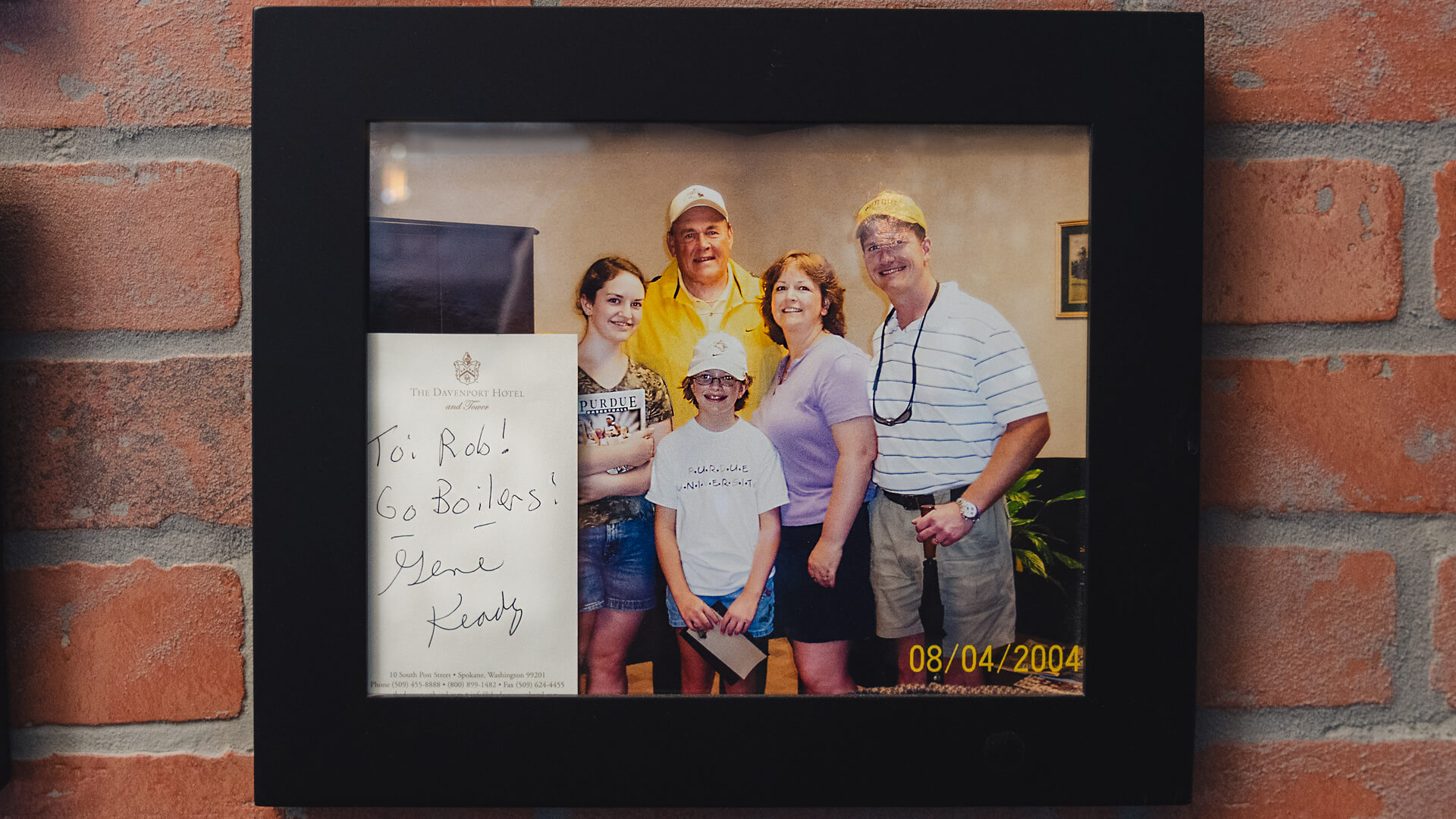
He asked if they’d like to visit Keady’s office and meet the future Naismith Memorial Basketball Hall of Fame inductee.
“We’re standing in the office, and I looked over to my wife and wink at her because she is so mad at me, but she’s gonna get to see Gene Keady now, which she’s super excited about,” Rob recalls with a laugh. “We just love Gene Keady.”
Once the longtime Boilermakers coach completed a meeting with a player, he turned his attention to the family waiting outside his office door — specifically the smallest member of the group.
“Gene Keady makes a beeline directly for Beth,” Rob says. “She’s just this little, short thing, and she’s got big old glasses on and her Purdue baseball cap pulled down so her ears are kind of flopped out. And he gets right in her face with the Gene Keady scowl and goes, ‘Where are you gonna go to college, little girl?’ And she looks up at him and said, ‘Uh, Purdue?’ And he says, ‘Come on in.’ So we all got to go into Gene Keady’s office, and he talked to us for about 30 minutes. He was just the nicest guy.”
Perhaps that fortunate turn of events influenced the Stanleys to wander into Mackey again on a visit several years later.
This time, they were camped out in the otherwise-empty arena watching the Robbie Hummel-era Boilermakers practice. All of a sudden, a door opened right behind the Stanleys and out walked Painter, Keady’s former player and successor, who has coached the Boilermakers for the last 19 seasons.
“There’s not another soul in that building except the basketball team, us — who snuck in — and now Matt Painter,” Rob says. “So he came over and talked to us, and that’s how we got a picture with Matt Painter.”
As for the photo of Beth and her friend in front of Tiller’s fireplace, that involves only one of several memorable interactions she had with the former Purdue football coach.
Beth was born in Cheyenne, Wyoming, when her dad was stationed at Francis E. Warren Air Force Base, so she always felt a special connection to Tiller, who coached at the University of Wyoming before Purdue and later retired to the state.
They could tell that both of us just came to life anytime we’d go back to Purdue. I’d get so excited that I’d do some pretty stupid things.
Rob stanley BS technology ’88
Just before the start of their sophomore year, Beth and a friend planned to travel from Great Falls, Montana — where Beth graduated from high school when her dad was 341st Missile Wing commander at Malmstrom Air Force Base — back to Purdue. The drive would bring them close to Buffalo, Wyoming, where the Tillers lived, so Beth took a chance. She sent a letter to the couple telling them that she would be traveling through town and inviting them to lunch.
“She never expected to hear back from him, but she put her phone number in there,” Rob says. “So I’m fixing breakfast one Saturday morning, and I can hear the phone ring upstairs. All of a sudden, I hear this rumbling down the stairs, and it was Beth, and she had Joe Tiller on the phone. He invited her and her friend to come stay with him and Arnette there in Buffalo on their way back to Purdue. Sure enough, they put Beth and her friend up in their little guesthouse, and they stayed up and played euchre with them all night. Joe took them to lunch, and then Beth treated them to ice cream afterward.”
‘It’s our happy place’
Maybe you have to be a Boilermaker to fully appreciate these stories, but boy, are the Stanleys ever some Boilermakers. Not only are Rob and Cheryl alumni, but so are Laura (BS apparel design and technology ’12) and Beth (BA mass communication ’16). And so are Laura’s and Beth’s husbands, Vinny and Zach.
Vinny proposed to Laura under the Purdue Bell Tower after her graduation. They were married on a snowy December day in 2013 at University Lutheran.
Meanwhile, Zach and Beth met at Greyhouse Coffee near campus while Beth was working toward her bachelor’s degree and Zach was finishing his PhD, awaiting his Air Force flight training assignment.
“We’ve got a bunch of Boilermakers, and hopefully our granddaughters will go there, too,” Rob says.
Their professional lives may have taken the Stanleys all over the world, but nothing compares to their bond shared via Purdue — a place where they have a common connection as well as their own individual memories.
They didn’t need to sneak into Mackey for that connection to exist, but thankfully they had a camera on hand when they did so that Rob has visual evidence to back up the Keady story he still loves to tell 20 years later. Same with the time they met Painter or when Beth and her pal snapped a shot with Tiller at his home.
Photographs help folks recall the important events in their lives and happily reflect on the good times they shared. As the photos in the Stanleys’ fan cave indicate, Purdue has been part of many of those family moments.
“It’s our happy place,” Rob says of their Boiler Room. “Our lives started at Purdue, as far as I’m concerned, as far as our marriage. Cheryl and I have been married since 1988. Everything goes back to Purdue. We certainly wouldn’t have been able to do some of the things that we were able to do had it not been for the wonderful education, the tough stuff that Purdue does to you. It’s not a gimme school. When you come out of that place, you can feel proud that you’ve actually accomplished something.”
We’ve got a bunch of Boilermakers, and hopefully our granddaughters will go there, too.
rob stanley
BS technology ’88






